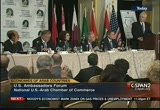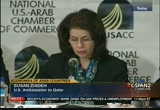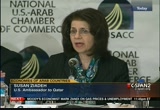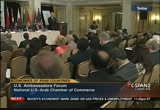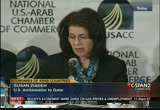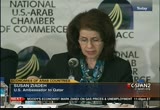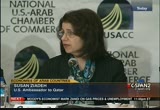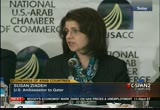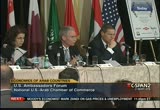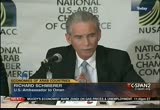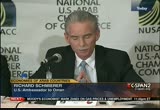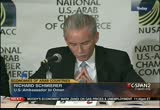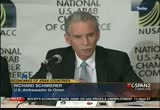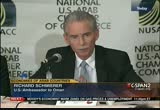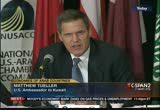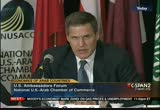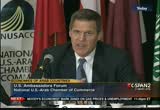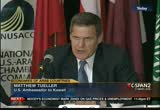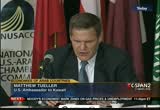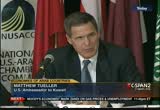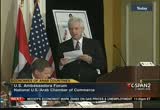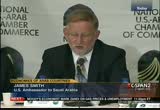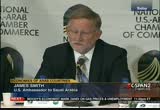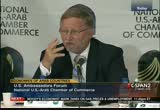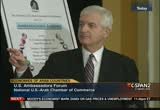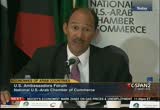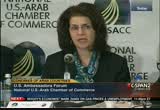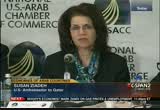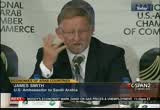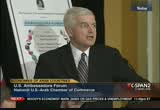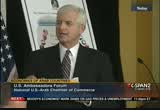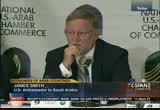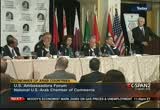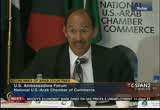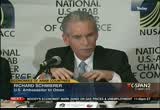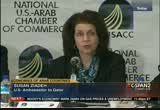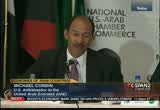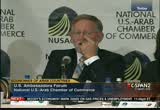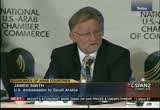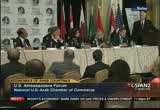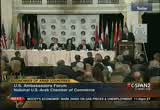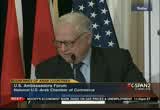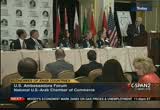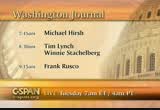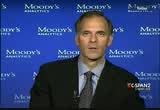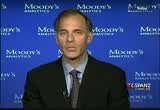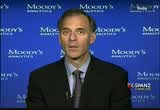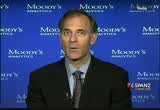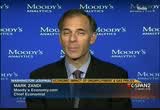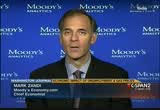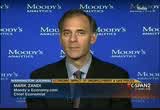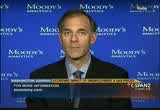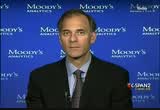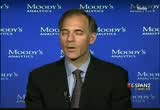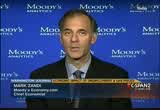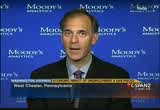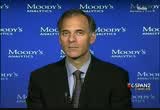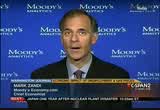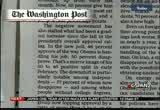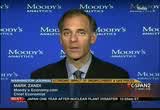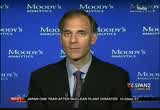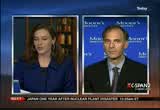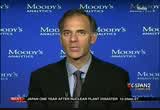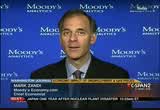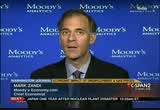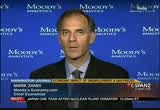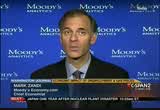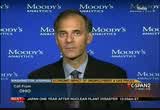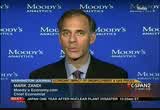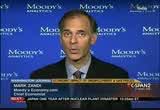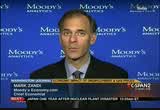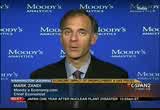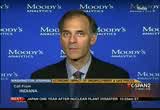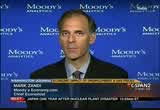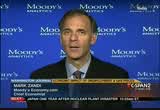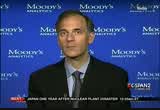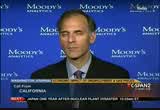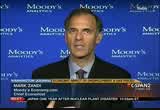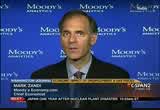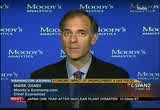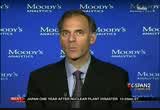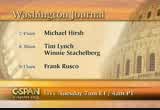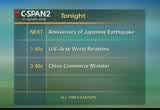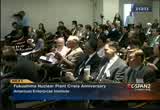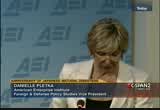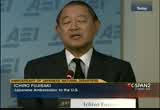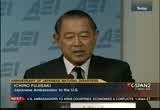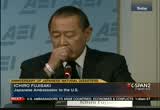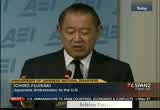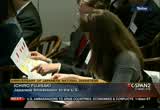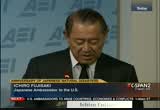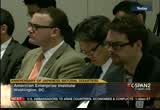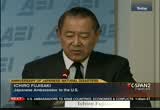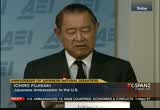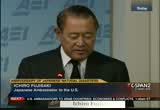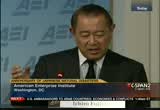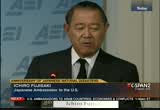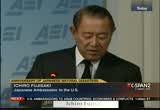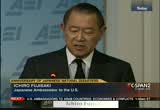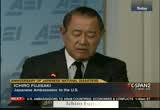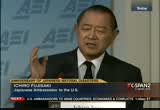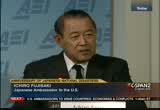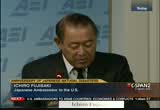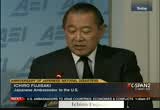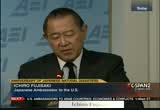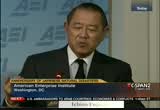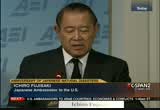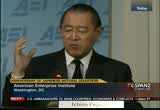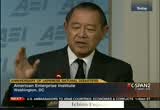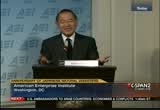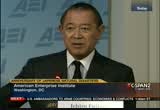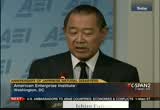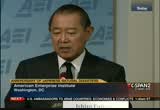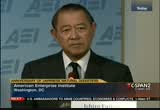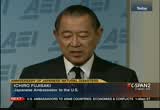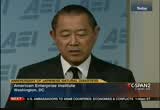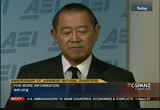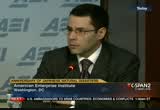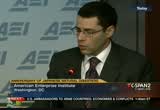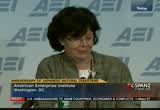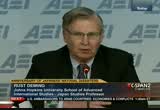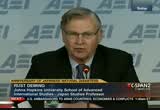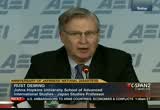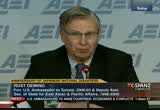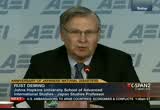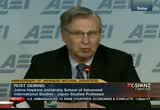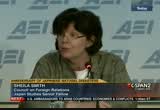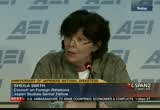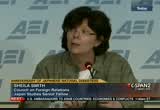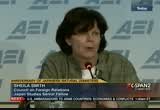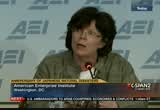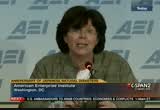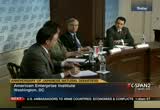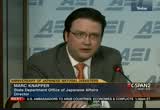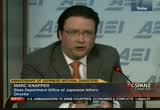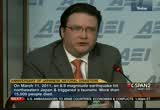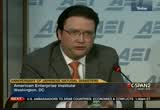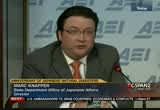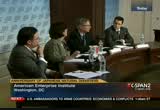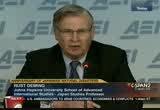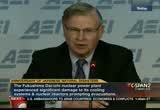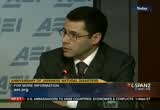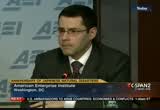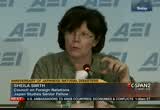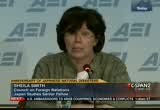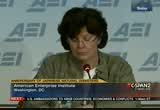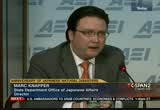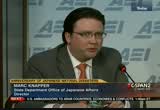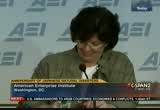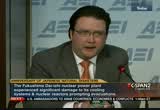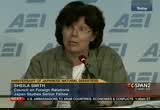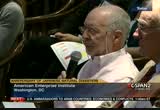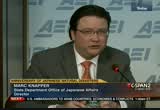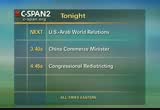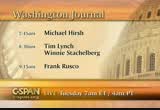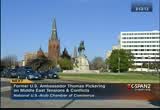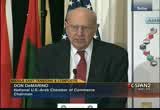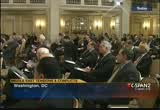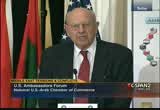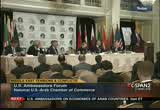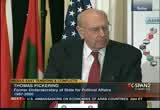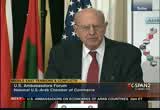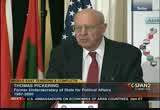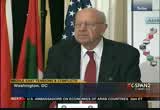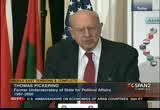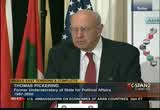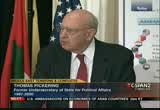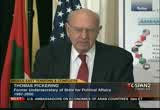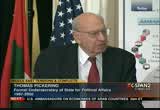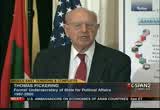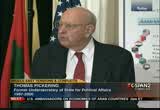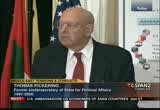tv Capital News Today CSPAN March 12, 2012 11:00pm-2:00am EDT
11:00 pm
ushers and we will have an opportunity to close the discussion. now, ambassador, the last time we talked it was in riyadh and would be interesting to get your assessment of economic opportunities and things that are interesting to keep in mind. >> as my colleagues from saudi arabia and from the united emirates have said that same is true we are open for business, and we are open for business with a great interest on u.s. products, u.s. services, u.s. technical know-how and opportunities for joint ventures and investments in other parts of the world or the united states. it is the world's richest state by per-capita and has the highest gdp in the world.
11:01 pm
it is also the world's leading supplier of liquefied natural gas. and in 2011 alone, the gdp rose 20% and is estimated in 2012 to rise at a slower rate but still between six to 10% which is a healthy feet by any standard but particularly in these economic times. and a lot of to try it on this has been due to the area of culture who has developed the last 15 years and has put forward a vision for 2030 with the development in a whole array of areas of human development, economic development, economic diversity, diversification and social development and as a part of his vision for 2030a good part of that is also the infrastructural development in the country and the diversification of the economy
11:02 pm
that moves away from the simple upstream energy production that has been really the growth engine of the country. what is true in the last five to seven years with the addition to his been developed a lot of which has been joint production with american companies like exxonmobil and conocophillips in particular over the last few years it has invested more than 16 billion in the gas sector alone has fuelled a lot of the wealth for the country but the leadership in the country understands the wealth in gas has to be diversified from upstream and downstream and there has been a tremendous emphasis on the development of petrochemicals and other kinds of related industries in the carvin sector in fact while qatar has been producing the
11:03 pm
petrochemical sector it hopes to reach 23 million by 2020. that is its goal. so again, while not totally moving away from the hydrocarbon sector but making sure that they are producing downstream products that increases the value chain for the production and also diversifies the use within the country and markets outside. linked to that is also a way of looking at the country away from the carvin sector, how to make themselves the center for education at which the have done through the foundation and education where i am proud to see education cities coast six major united states can ever cities with branch campuses providing education not just for the qatar university education but for people of the region. so even though we don't always think of education as an export and absolutely in qatar is and it's a big export and it's contributing to the development of the next generation of qatar students and workers.
11:04 pm
they are looking to the area of sports. the hosted the asian games in 2006. they just recently hosted the arab games this past december and january and as many of you know, they have won the bid for the cup of 2022. this has meant that all of their infrastructure development that was on board for the vision in 2013 has now been moved up by eight years to the year 2022 so let me give you a little over a few of the major projects that are being undertaken in this regard because this is an area in infrastructure where we as a country a tremendous capability, we have tremendous brett not just in program management but also in the development of these on land and building an infrastructure training and maintenance. the highlight of this are the airports that are being built.
11:05 pm
it is a $15 billion international airport that has had a program management of this is due to be completed in 121212 which is when the opening is going to be and they're going to be additional parts to the airport that will be built after the new international airport is built. this is the area right for u.s. businesses and expertise. there is the 7 billion part of that now being developed by the company i believe it is as part of the project management and there will be the more bids to go into the construction management of the project in the rail project that is light rail, train and people movers, that is metro, all of this needs to be constructed between now and 2020 to be a will to accommodate all of the people coming in for the
11:06 pm
world cup and permit the business and transportation that is needed. the road networks where there are for the project and roads to the american companies have done well on a lot of these projects from parsons but the new projects that are going to be built, 20 billion in the next few years, so a lot of work in that needs to be expanded and another 3 billion the next six years. this is not to mention all the work they are doing in the renewables as ambassador smith replete pointed out. the issue of the gas is going to revolutionize the whole region but qatar is now as a leading export continuing to develop its capability it is increasingly shifting its market away from the u.s., still exporting to
11:07 pm
europe. i might add the u.k. is almost singularly dependent on lng from qatar but is now shifting its vision towards the east, india, china after the catastrophe that took place in japan recently japan is emerged as one of the top in porkers. so again more markets going to the east and no end in sight in terms of the demand for their products so they are expanding in all areas of diversifying in science, technology, renewables and making a mark for themselves as a diversified economy with much more than just the energy sector as their focus. thank you. >> thank you come ambassador. i would like to hear from the ambassador ensher. >> like our neighbors in the gulf, we also have a country
11:08 pm
which has a growing economy, it's very welcoming to the international business and particularly to the united states business it has a lot of needs and the young populations of their looking to do exactly what the title of the session is called and that is to diversify their economy to ensure that beyond the area of hydrocarbons they will have a well structured diversified economy. let me conceptually defied the commercial opportunity into two elements one as a market and the second as a platform that is a very important way for the business is looking to engage in the region should look as a market oman is doing a lot of things. they have been very successful in not only maintaining that actually expanding the hydrocarbon production to where
11:09 pm
they had anticipated some reductions and actually had the decline for a period they've turned that around and now or generating a record revenue and are using those revenues widely to invest in the future and i will get to that in a minute. one aspect of that which again is another example where american companies can play a very important role is probably the single greatest contributor to the ability to turn around its previously declining petroleum production was with occidental petroleum revitalizing one of the main oilfields and increase production by over tenfold and that turned around the declining production so that this company bringing in its technology but working closely with the omanis. i visited recently and is now largely run by omanis and is a
11:10 pm
great success in terms of american technology leveraging the openness to such investment. a theory domestically for oman it's not a large country for the populations there are about 2 million omanis but they're looking to expand their economy in a number of areas. tourism is their highest priority but they are also looking at services, certainly training franchising which has been mentioned but the consultants see they are very much looking for the good consultants to support to projects that are under way. in terms of the structure of the market, the a couple of specific of santos. one is we do have a free trade agreement with oman, and more and more companies are leveraging that in order to be a will to face production for the market because of the advantages
11:11 pm
that occur in the free trade agreement and that leads to the second element and that is oman as a platform. if you look at the matter very quickly it has a great advantage of law the outside of the gulf upside of this strip of hormuz and oman is consciously looking that in order to make itself the preferred location for companies that are producing and marketing into the gulf so they are building parts and expanding the northern port building a new port in the middle of the country and expanding the shipment hub there building airports and the line that susan mentioned so they are setting themselves up as a location for companies that want to produce or market anywhere into the gulf can do so very conveniently and very safely by bringing their
11:12 pm
goods into or out of the court and avoid having to go into the gulf itself. the upset of the zones with all of these locations so you can actually do your business without having to deal with local taxes. the have an ambitious training program at one of the responses had to last year's events where young people were asking for more opportunities and more employment is the sycophant ramp up of education and training and so they are training them to be a valuable work force and they do have a large number who will be that a viable work force. so it does provide a lot of advantages there. as you know, they have very wise and very stable leadership and the views to those elements they have had such as the free trade agreement to modernize their commercial legal infrastructure that also makes them an
11:13 pm
attractive location for investment so most people find that larson is a welcoming country and people that live their love living there and companies like to put people there in order to be doubled to work some elsewhere in the gulf but to know that they are in a safe and comfortable location which is what they find when they are in oman. but we stopped there and answer any questions. >> thank you. our last speaker is ambassador tueller of kuwait. >> i appreciate the opportunity to address this topic on diversifying away from hydrocarbon. traditionally the american companies that know the market best and have been involved in the hydrocarbon sector and the defense feels no to wait well and know their contributions and involvement have contributed to the security and prosperity that they enjoy today. however, just as many recognize the future sustainability to the economy will depend on their ability to diversify i believe
11:14 pm
also the health of our relationship will depend on our ability to take that same step and diversify the u.s. private sector engagement in kuwait. one of the primary advantages is a business and investment destination for u.s. firms as the historical positive and very strong relationship between the two countries. at the same time they recognize the value and quality of u.s. goods and services and expertise and regularly reach out to me to tell me that they are interested in seeing more u.s. firms come to kuwait investing and operate there. as a part of the experience of the arab spring discussions with the government and through society have begun to sharpen their focus on developing strategies for sustainable economic growth. the old parliamentary elections on to be very second command in the run-up to those elections many of the parliamentary candidates call on the government to jump start large-scale development projects designed to diversify 28s
11:15 pm
11:16 pm
>> american businesses involved in all aspects of education find new opportunities for potential involvement. the government plans to invest over $8 billion to develop its education sector over the next five years. that development strategy includes university expansion plans, building new educational facilities, training teachers, and developing new curricula at all educational levels. in the field of health care, another area of u.s. expertise is facing demand growth, over the next five years, the ministry of health plans to
11:17 pm
upgrade expanding hospitals as well as build a number of new medical pom plexes. the health officials expressed interest in working with u.s. hospitals and medical schools on the projects including in project management, health care consulting, human resource development, hospital administration, and technology transfers. kuwaity expressed their desire for medical treatment. the government of kuwait sponsors treatment abroad for 12,000 kuwait nationals every year and u.s. is a primary destination for the group of patients. cue kuwait likes american doctor, and u.s. companies have a natural competitive advantage in bidding on health expansion contracts. in the field of i.t. and telecommunications, there's a wealth of opportunities, particularly for u.s. companies that are able to provide the level of technical expertise
11:18 pm
that kuwait requires as it aims to upgrade existing infrastructure. over the next 5-10 years, they need to embrace new technologies for a use of variety of fields in government, education, to health care industries. one potential partner for the u.s. in u.s. i.t. and telecommunication firms is the ministry tasked to oversea the upgrade of the telecommunications infrastructure and embarked on a plan to install a network over the next five years, phase one just completed, and the tendering process is entering the second phase as the ministry looks for firms to be able to advise and supervise the design and implementation of the massive project. more broadly, they are exploring ways to utilize technology and improve government efficiency and expand services for kuwait residents? some of the projects under discussion improve data security, streamlining government agencies, and
11:19 pm
increasing the number of public services available online. in sue mages, the bilater rail commercial relationship continues to form a core part of the bilateral relationship as government and its people. at the embassy, count on us to be there to help to support your efforts to do business in kuwait. i encourage you to contact us either through the foreign commercial service or my office with any questions or assistance you may have. i hope you'll return to kuwait often if you've been there in the past. if you have not been there, i encourage you to visit, take advantage of the new opportunities to support the development of its education, health, telecommunication, and information sectors as well as in the hydrocarbons and defense sector. thank you. >> thank you very much, each of you. the first question that actually came in from the add gens was -- audience was for u.n. ambassador smith having to do with alternative energy, but a very particular kind, nuclear. the question really is #wr is
11:20 pm
saudi arabia on nuclear energy? has the cabinet approved nuclear, and is there a plan? >> yes, yes, no. [laughter] kcare stood up about a year ago and the king abdullah center for renone energy given the charter of coming up with a plan for saudi arabia, and mostly contracted out the whole host of people to look at this. the proceeding, and i think wisely to canvas the globe for the best technologies for wind, solar, and nuclear. in the case they started with us, the brits, the french, south
11:21 pm
koreans, chinese, and the russians, and the idea here is to understand all the technologies that are available, and then to identify the technologies that are most appropriate for saudi arabia. no, they don't have a plan yet. they are headed in that direction. you will see a balanced plan that'll focus first on solar. saudi arabia wants to become an energy country, not a petroleum country, and the university has been given the technical challenge with coming up with a plan to generate the equivalent of 8 million barrels a day in electricity from solar power. saudi arabia has sun and space, and so they'll be rolling this
11:22 pm
off like a printing plant, not worried so much about that, trying to solve the technical issue of the transportation of electricity, one of our squared problem, and if they can do that, they're making money off solar in three ways, putting the equivalent back on the open market, taking the excess and sell it to their brothers in the region because they are foesed on a gcc grid, and, third, saudis do not export natural gas. that's as fee stocks or as energy advantage. they never use the word "subsidy ," of course, but you can have that with electricity, of course, and not natural gas, and natural gas is in the open mark. they get money three ways off of it. wind is a bit of a problem because the theory works good, but the pitting for wind is a
11:23 pm
problem to overcome before. nuclear is committed to moving in that direction, and they are working dill gently with a government-to-government solution. if we're able to proceed ahead with that, you can identify and proceed technologies and the reality of is it they are singular whetherly focused on the small modular reac tore idea -- reactor idea, and we don't have the technologies yet, that technology's ten years off. the short answer is they are moving in the right direction, longer answer is a plan is coming together, it's not there, but i need to make sure american companies are there because there's a huge opportunity for us. >> thank you. the second question really is directed, i think, to any of the panelists. i might ask ambassador corbin to
11:24 pm
address it first because it has to do with advice on how to engage with gcc countries with sovereign funds and i've had experience with such entities, and if you might off a few words on that, and then i'd enviet other panelists whose countries do have either sovereign investment funds or very active private equity funds to offer comments as well. >> i would just say this is an area where obviously the emirates have a great interest in this. there was, you know, the 2008 crash in dubai that affected abu dahbi. there was a hold on projects, that was lifted, moving forward with their investments, they
11:25 pm
are, again, open for business again. there were arab spring concerns, which they've addressed now. they are moving forward. i think that the overall message is that the pause that we saw last year is pretty much over, but there are -- there will be concerns going forward, and there's certainly focused on what happened in dubai, and they are not going to spread their money awatt -- the way they used to because the model of dubai. this is not an area that is something that we get into extensively, but i don't know if the others have things to say about that. >> others? >> well, they are focused more on sovereign funds than the type of investments they can do. not as old as the ones in kuwait or as large, but they are quickly making up in a short time because of the tremendous
11:26 pm
wealth they accrued from the lng that they are exporting. they are looking for investments overseas. a lot of it looking to europe, to the east, some in the united states, but, again, looking for the kinds of things where they can pick up the industries or properties that are a little disstressed and figuring out how they can turn them around and buck them up. you see a lot of their buying of greek debt and companies in lux emberg, and these things, but i'm very happy to say they also have a big investment in the city center project here in washington, d.c. which was a project in search of capital, and so now they made a big $700 million project and taken a big step into the u.s. market with this project, and so we'll see how this goes, but i think it is whether their appetite for more
11:27 pm
projects, it's just finding the right steps. >> others? >> i would just add and echo what matt said before when he said go on the website and connect. i have a luxury of having a very robust foreign commercial service, and as companies come in, i'm amazed that american companies are confused sometimes about how to connect, and i say just go on the website, and i would ask you and encourage american companies, those of you in the business counts, go on the website, and it takes you right to fcs and we're in the business of connecting you, and our fcs, over the last year, connected more than a thousand american companies with other counterparts in saudi arabia, and so it's something they do for a living, and so ask them not to be shy, just contact us,
11:28 pm
and we'll help you. >> on the question of the investment funds, kuwait, competitive advantage, has one -- kuwait, of course, has one the best managed sovereign investment funds in the region. it's notable for its success. it does -- it follows a very conservative investment strategy, works closely with a number of well-known investment banks, not just in the u.s. and europe, but around the world, diversifies well, and it's done realm. i'm not sure how i advise -- they probably are not too open to approaches from potential consultants or advisers. on the other hand, there's a number of private equity funds. a lot of those are highly leveraged, some wiped out in the 2008-2009 period, but kuwait has a lot of private wealth, and as those begin to rebuild, i'm sure the u.s. is still regarded as the preferred destination for investments. >> thank you. there's a general question about
11:29 pm
unemployment and youth unemployment, and it is addressed to ambassador smith to respond to it first, but, again, i think this has somewhat wider applicability, and i encourage ambassadors to pipe up on it. the gist of the question is that many of the jobs in the saudis private sector are occupied by skilled and unskilled. at the same time, there's high youth unemployment rate in saudi arabia, and so the questioner asks, do young is saudis object to working in jobs that young americans or others might take? how real is the problem of youth unemployment? i assume this is as it's perceived as both political and economic problem, and so i'm sure it's great for your reflections on it and vairkses that play out in what these
11:30 pm
companies represent. >> i think the youth unemployment problem today is overstated. the challenge in a generation understated. the -- certainly within the center of the country and there is this tendency to not migrate to jobs that they have someone else do. not as true in the eastern province or hassa where they beg me to get american companies there to set up factories. they want to work. the refinere, exxon mobile facility, that's blue collar, white collar saudis, and it's hard to say.
11:31 pm
the college represents 90% of the public sector and 10% of the private sector. the reality is the government is the biggest obstacle towards developing the private sector in small and medium enterprises. that's the challenge with diversifying the economy, and they are tackling it, but you know, look at the saudis's issue today, and i mean it's good they target jobs and the expectation is that you go and get a job but when you target third country nationals as the problem, you identified the solution as similar -- if we were going to solve the california unemployment problem by sending all the mexicans back so there's
11:32 pm
more jobs to pick strawberries for americans. that's not going to sol the problem -- solve the problem. you have to create new industries, new enterprises. it's about new technology creation and new industry with this hugely educated young generation coming of age that you bring in entry level management and know they have a career to develop over time. that really is the answer, and you got to really focus on the private sector to do that, and entrepreneurs, and we're certainly helping with that, but it will be a challenge for that transformation. >> thank you, are there versions of the youth unemployment issue that play out in the country's to which you are accredited, and any of you would like to comment on? >> i add for the uae, they have abundant opportunities, dynamic leadership, and the prime example of this is the employment of women and finding
11:33 pm
ways of getting women into the work force. they realize if they do defense, airlines, hospitals, pewsful nuclear energy with a million population, they really need to use all their home resources. there are issues, but i think that the leadership is really focused on youth, and i think there is a positive story going on in the uae in general. >> i think there is somewhat of an element of correlation in ohman, is minority, and you have much of the economy run at the embassy, and majority of the employees at the embassy, and our per capita income is $20,000 a year. when you have $100,000 a year per capita income, your needs to enter the work fors in the jobs that are available of much less,
11:34 pm
and so i think that's an element that plays a role in what the expectations are and in what the needs are. i think in our country, the omanis doing a good job of training, of identifying where employment can be made available and then training omanis to take that employment. >> yes, susan? >> it's a little bit different in the sense that it's a small native qatary population. it's a small population. men and women are entering the work force because they are educated. skilled qataris almost ask for the job and price. because there's so much expansion and not enough qataris who are skilled to go around in these jobs -- actually, that they're are opportunities for non-qataris in the work force at a skilled level, at a high
11:35 pm
paying level, and you're not taking any jobs from qataris. there's too much work to go around and the local population can't fill the jobs, and so it's a very different dynamic there. >> thank you. look, there's one last question that's really a group question. it might be a good one to end on. the first part of this question i'm going to have to ask you is you'll have to address is this a true perception? then, if so, what should be done about it? the questioner asks, why are european businesses in general so much more successful than u.s. businesses in your countries? is that true? if so, what's the problem? let's start ambassador corbin, with you. >> it's not the europeans we have to worry about, but the turks, chinese, and the indians to were about. they were competitive and french are active, good business counsels, they have -- very competitive and prepared to go
11:36 pm
overseas in a way we're only sees u.s. companies do now, but it's not the europeans we have to worry aboutment i think it's the other countries, and i think we have to be more aggressive, highlight the fact that we have innovation. the example of food, looking at 80% of emirates, and we do things that our competitors are not doing, same in health care and other areas where we have the advantage. that's what we have to take on. i don't think it's the europeans. i think it's the other countries i mentioned that are a problem. >> others? did you have a different view or same view? >> no, i hear this from guys all the time that say sarkozy comes in, they got the contracts. that's whining. [laughter] you know, if you follow the money, it takes you to riad
11:37 pm
region. there's 50,000 saudis going to school in the united states today. that's their choice. they want to come here for a reason to connect with american businessmen and businesswomen. we came home after 9/11, and that left a void. the -- we were unaccompanied for five and a half years. my wife, janet, was the first spouse to come back in five and a half years. well, guess what? the world doesn't like a void. who filled it? the south koreans and the chinese. if you want it cheep, go to china. here's the problem. china wants to be the world's manufacturer. they are doing exceptionally good job of that. what's saudi arabia's problem?
11:38 pm
jobs. if you want technology transfer, training and education, if you want to develop your own infrastructure, you're not going to get that from the chinese or the south koreans. you will get that from americans. i repeatedly talked to american businessmen about the value proposition that they are offering. if they ever let a competition result in a price competition with the chinese, they are beginning to lose. if they can present a valued proposition that comes with the education and training package where you're going to create an entity that the saudis run over time and increase an industry there where you create a job here as you're creating one in saudi arabia, you got a winning combination. the american business and industry is very competitive because of that valued proposition. >> others? >> i do hear this perception, and i think maybe it's sometimes fed by the fact that european
11:39 pm
governments are generally following very aggressive policy of supporting commercial travel and visits and senior government officials from european countries to be accompanied by large business delegations, and we might look at doing more of that, but i don't see that bearing out in the trade figures. at the end of the day, it comes down to well, what's the type of product? in the areas i touched on, what i think they have in common is education and health care and that type of infrastructure, this is where at least in kuwait, they want the u.s. involved because that's where it's touching my life, this is where the value is, this is what i want the best of, and they turn to the u.s. for that. >> good. well, we're on a tight schedule. we have to close. before i do that, i want to thank you for your insights and your service. [applause]
11:40 pm
>> thank you ambassador larson. i want to thank all the ambassadors today. i'm an old guy, and when i started kicking around in the middle east back in lincoln's second term -- [laughter] the last place you would visit was the american embassy. no one knew anything about what was going on commercially, and anything you said was going to go into cable and slugged to 19,000 recipients in 45 countries. as we saw it as a one-way street. we gave information. we got painfully little in return and certainly no great commercial wisdom. i can remember back when -- having a senior moment -- many
11:41 pm
ways, i credit that to larry who said, you know, we have to change this. we have to make this very user friendly. we got to help our american companies. i was at commerce, spectacle of this, but larry made me a convert. it's extraordinary today. i don't think there's a better group of informed ambassadors at any country has than ours. not only informed about what's going on commercially, but understand what's going on commercially, and as ambassador smith says, you know, he even gets down in the value proposition understanding that, and how to increase business, and so on behalf, i think, of all of us in the room, i want to salute you guys, thank you very much for your service and i hope you can come back and we do this again next year. thank you. god bless you.
11:44 pm
>> host: hi, there. >> guest: good morning. >> host: talk to us about unemployment, the rate -- we got that news just a couple days ago. what did you make of that? >> guest: good news. the unemployment rate, well, obviously, still very high, 8.3%, so that's very high by historical standards, but it's good news we're moving in the right direction. the peak unemployment rate back a couple yeahs ago was at 10%, and so we're making a lot of progress. more importantly, or most importantly, creating a lot of jobs now. in the last three months, we've created on average close to 250,000 jobs per month. that's pretty good job growth if we sustain it, and then we'll get unploiment moving lower in the next few months. >> host: you told "politico" a couple days ago what we are seeing 1 a reduction in the number of layoffs, but still not seeing strong hiring yet. >> guest: yeah, that's a good point. most of the improvement in the job market, and just to give
11:45 pm
context, the job market has been improving for two years, the job growth resumed back in february of 2010, and so we've seen steady job growth for two years. for most of that timing it's been related to fewer layoffs, businesses reduced the number of layoffs. we have not really seen a significant pickup in hiring. that's really the missing ingredient in this economic recovery, but the good news is seemingly in the last three to six months, they are hiring at a low rate, but it's picking up, and that's encouraging suggesting that businesses are starting to gain the confidence necessary to go out and what's needed to help the economy. we have a lot of work to do, but we're moving in the right direction. >> host: a question that comes up all the time with job numbers is what are we really seeing? knewer layoffs or people who are
11:46 pm
not filing for unemployment? >> guest: well, in the case of jobs, it -- you -- it's a question asked to the businesses, of businesses responding to surveys from the bureau of labor statistics and they tell them how many people are working for them. that's an actual count, it's measure of employment. there is a little bit more difficulty of measuring unemployment, and to be counted as unemployed by the bls, you have to be looking for work, be in the labor force, and sometimes it gets difficult to determine whether people are looking, not looking, looking hard enough, that kind of thing, and there's more debate about how much unemployment there is, and i think broadly speaking, 8.3% unemployment is a good measure of how the economy's doing. it's still very high so the job market's still very difficult, but it's down from where it is, and it's moving lower, and i
11:47 pm
think that's happening now as well. >> host: here's the numbers, democrats 202 347-0001. let's look at the february numbers are. 82,000 jobs with a bump up. health care and social assistance bump up of 61,000. leisure and hospitality, 44,000, and also seeing jobs in manufacturing and mining. what we lost jobs in was specialty trade contractors. these numbers are from the bureau of labor statistics. mark zandi, where do you read where job growth is happening? >> first and foremost, the job growth is broad based across industries and regions of the country. if you go back to where it began a year or two ago, the job gains were narrowly based.
11:48 pm
it's encouraging an increasing number of industries are adding to payroll, and you take them off. also regionally, we're starting to see job growth in many parts of the country, and most encouragingly in the hardest hit parts of the country, places like florida, arizona, nevada, california. these were states that got creamed by the bust in the housing market, but they are now showing signs of life. that's good. there's still some parts of the economy that are not creating jobs and stimlosing them, and so local government is the biggest drag on the job market. that's a lot of k-12, local governments, as you know, under extreme pressure, and they have to cut. construction is still weak. the housing bust is winding down, but it's not quite over, but i would anticipate the construction employment improving in the months ahead, but it's still soft. broadly speaking, the job gains now are across lots of
11:49 pm
industries, and, again, that's encouraging. >> host: could rising gas prices throw a wrench in economic recovery? >> guest: yeah, sure. you know, there's many things to be nervous about. the economy is still fragile. people are still very nervous about what we went through and what they are still going through, antething that makes me most worried -- and the thing that makes me most worried is the run up at the gasoline prices. every penny increase in the cost of the gallon of gasoline costs the american consumer about $1.25 billion over the subsequent years. go back to december, the cost of a gallon of gas regular unledded was $3.25. we're now up to $3.80. it adds up to significant dollars. i think if we go over $4 for a gallon of regular unledded, that'll be a problem because that's a psychological barrier, not only hurts because it takes money from the pockets of
11:50 pm
american consumers, but it starts weighing on confidence and consumers start pulling back, and so this makes me the most nervous, at least in the near term. >> host: chief economist with moody's economy. author of the book "financial shock: a 360 look at the mortgage implosion and how to avoid the next financial crisis." going to the phones to hear from curtis, democratic caller in richard monday, virginia. good morning. >> caller: good morning to you both. i want to ask the gentleman about the gas prices, and is the gas on number one export? >> guest: no. thanks for the question. no, it's not an export. we do export some refined petroleum product, but we import a lot more energy than we export and so we're still very large importers of crude oil, and
11:51 pm
that's obviously the key ingredient to gasoline, and so when oil prices rise, that's a problem for our economy because we produce some of it, but we import a lot more of it, and the way i kind of think about the effect of gasoline prices on our economy more broadly is it's lome -- it's almost like a tax increase. if we had to spend more to fill our tanks, then we have less to spend on everything else. it's a pernicious tax increase because it hurts lower and middle income households who spend the budget on gasoline and higher income households, and the amount of money on gasoline goes to overseas energy producers in the middle east and other parts of the world, and that doesn't do us a lot of good. it's a difficult thing for the economy to digest. gasoline prices, higher gasoline, higher oil prices, there's really nothing worse for our economy. >> host: mark zandi, twitter
11:52 pm
asks whether drilling for more oil in america, would that lower unemployment and lower gas prices, and he says if so, why are we not doing more of it? >> guest: well, yes. if you do drill more for energy, oil, natural gas, coal, it produces more jobs. in fact, if you look at ploiment in the mine -- employment in the mining industry where the jobs are counted, it's quite strong and in parts of the country where we produce a lot of energy, things are going very well, and so for example the strongest state in the country in terms of job creation is the state of north dakota, job growth is the 4% or 5%. heavy job growth and unemployment is rock bottom. if you need a job, they can move to north dakota and find one quickly, but here's the but, it's relatively small. the amount of jobs here are very small in comparison to lots of
11:53 pm
other things. for example, i mentioned the losses in local government. we lose 15,000 jobs -- 10,000-15,000 jobs a month in local government. we're going to get that -- gains in the mining sector over a course of five to six months, so it is a very small sector of our economy. i think if we can figure out ways, good ways to drill for and find more energy in our united states and do that safely and environmentally sound way, i think that makes perfect sense. the more energy independent that we are, the better often we'll all be. >> host: virginia is in clarksville, tennessee, republican caller, good morning. >> caller: good morning. i'm concerned about the way they cap unemployment. every day you turn the tv on, and some big company has laid everybody off or gone bust.
11:54 pm
then the president talks about all the new jobs. if it's new jobs coming up, they are minimum wage, and that means most of the minimum wage, $7 and something goes for gas prices. you don't have much left after you buy gas. >> host: virginia, what are you seeing where you live in clarksville? what's the economy like there? >> caller: oh, it's rough. people got laidoff and what mainly happenedded is businesses closed. that left people on unemployment. >> host: let's get mark's take on this. go ahead. >> guest: well, you know, it's still very tough, and the 8.3%
11:55 pm
unemployment rate, if you also consider all of the people that are working, not counted as unemployed, but working part time, marginally attached to the work force, and then the number's closer to 15%, and so 15% of the work force is unemployed or under employed. that is the high, very high by historical standard going to the caller's angst, and it's been a very difficult period. even in a very good economy, one that's doing very well, you are going to have companies shutting down and closes plants and moving things around. that's part of a dynamic economy. you always have winners and losers in even of the best of economies, and so we'll see that.
11:56 pm
in recession, of course, there was a lot of that because there's difficulty. in the last 6-12 months, those plant closings, those reductions in work forces has come down very significantly, and that was quite low. in my view, that's not -- you know, that's still an issue, particularly more of an issue, but the bigger problem now is jobs hiring -- getting businesses to, in a sense, get the grove back, their confidence back so that they begin to look for opportunity and start to expand operations to invest in and hire more, and right now, that's been the missing ingredient, and that's what we need to see before we all start to feel comfortable about how things are going. >> host: you're asked on twitter, companies got rid of the 50-year-olds and older and those near retirement, and the
11:57 pm
young guns will never rehire them. what do you think about that? >> guest: well, i think there's -- that's a good point, particularly older workers in their 50's approaching retierm, that's particularly hard on them, and it's been really hard on -- this recession and weak recovery's been hard on younger workers. if you look at the unemployment rate for people in their teens or 20's, it's very high which is why we have lots of young people living with their parents when normally they would have started a home and been off and running. it's been hard on both groups. my sense is that the improving economy will benefit younger workers first that were already starting to see some improvement in hiring and job creation for younger workers, particularly, obviously, for those with a college degree. education is so important in this economy if you want to get a job and get a good higher paying job, you need a college
11:58 pm
degree or certainly a high school degree, and so that's vital. older workers, it's going to be a lot tougher in large part because it's going to be hard for them to get back into the work force, and in many cases, there may be jobs in parts of the country where these folks have a hard time moving to or don't want to move to, and so for older workers, i think it's going to take a lot longer before they start to feel the improving economy. for younger workers, i'm hopeful they feel is now and feel it much more clearly over the next year or two. >> host: the pessimistic tweet that says if you're over 50 in the usa, you're kicked to the curb. what's gary has to say in pennsylvania, independent line. >> caller: yes, hello. >> host: hello, go right ahead. >> caller: is it true that obama tried to pass four job bills through the republican congress and that they turned them all down?
11:59 pm
still, they blame obama for lack of jobs? suspect that the republicans -- isn't that the republicans' faults, not obama's? >> guest: well, the president put forward a number of proposals over the past three years to try to support the economy and create more jobs, and the most recent was last summer the american jobs act, and that was a piece of legislation that had a number of different proposals to try to help the economy and support a broader job market. some of the proposals god through. the tax cut, the holiday we're enjoying, the 2% tax cut, that was part of the agent that got through congress. emergency unemployment insurance benefits, that was part of it, and that's gotten through. actually, the republicans, the republican congress has put forward proposals as well.
12:00 am
last week, they put forward proposals, and, in fact, i think the administration spoke positively about the proposals, and so there's a good chance those things will get through. ..ll get through. so, i do not think it is constructive or even accurate to blame one side or the other. there are different perspectives and approaches. it would be nice if we could come together more often and get more things done. that would be helpful for our economy. the have been able to get some things through. in my view, those things have been helpful to the economy and job market. host: since our last caller mentioned politics, let's stay on that. ratings are a sliding for obama's job on the economy. the negative movement has stalled a gradual increase since the fall.
12:01 am
his reelection prospects are getting a boost from the plunging unemployment rate. according to economic and political analysts, "the financial times" piece is listing the mood. mark zandi, if you're advising ntenr fot oa republan how do you interpret this data that's out there? >> well, first, because i'm an economist, i think the economy matters, so i think that's key to how the election unfolds for the president and for all incumbents. i think if the economy continues to show improvement over the next six months leading up to the election over the past six months, then the economy will be a tail wind for incumbents, for
12:02 am
president obama, it will be easier for him to win re-election, obviously other things going on that could win the day, but if the economy is continuing to improve to the same degree, i think that's going to be helpful to the president and other inculp bens. if the economy stalls out or backtracks, let's say, for whatever reason, glen good-gasoline prices go higher and causes the economy to falter, then it's going to be harder for the president. so, -- and incumbents. so to me the economy matters, and right now if the economy sticks to script, if it stays where it -- continues to improve at the rate it has, i think that would favor incumbents, including the president. >> mark zandi advised john mccain during the 2008 presidential race. let's go to memphis, tennessee,
12:03 am
larry, democrats line. >> caller: good morning. i have a quick way to get the economy back on track and lower the gas prices. vote all the republicans out. go back to the reagan administration, they started leaving -- the jobs leaving and lower the tax rate, and he lowered the minimum wage, lowered the tax rates on the rich, and run those jobs how unemployment rate then. you ask bush, you ask bush one, the saving and loan crisis, war, in iraq, and then you had bush two, he came long and afghan and iraq, 9/11, the housing crisis. he wanted everyone to own a home and look what happened. the republicans got is in this situation to make the rich,
12:04 am
rich -- >> host: to get jobs legislation passed in the house, is that a good sign? >> caller: a very good sign but the republicans are against it. >> host: the jobs act package aid economy with six bills and the story says, leave it to washington to pick a fight over noncontroversial legislation that everyone loves and who is jockeying to get credit for the legislation. there is anything else you want to add? >> guest: no. i think it's important that if -- we have two parties, different perspectives, at the end of the day we have to come together as best we can to pass different pieces of legislation to address our economic problems. so, i think it's much more constructive to figure out where common ground lies, and in fact i think there is common ground. we just need to work hard to fine it. >> host: new jersey, sayre remark republican, good morning.
12:05 am
>> caller: good morning. how are you this morning? i have a question for mr. zande. where do they get the figures for the unemployment? they say they get them from the labor department. and does the obama administration have anything to do with the numbers that are given to the labor department? it seems that the last time we had a fight when congress or passing the bill between the president and the congress, and unemployment wasn't funded for a while, when they came back, the unemployment number was totally changed. so many people were just dropped off the unemployment number. can you explain to me how that is done and why? thanks a lot. i appreciate your time this morning. >> guest: thank you for the very good question. i'll try not to get too geeky on you. there's a survey that the bureau of labor statistics, an
12:06 am
independent government agency, runs every month. they interview 60,000 households across the country. and they ask these households, a wide range of questions, to try to determine, are they working, if they're not working, why; are they looking for work? and through this very detailed questioning, they determine whether that person is employed or unemployed. and then they find out a lot of other things, too. if you're unemployed, why are you unemployed? if you're unemployed -- if you were offered a job would you take it? in fact, it's amazing the amount of information that is available from this particular survey. the administration -- the executive branch has no impact on the survey. they aren't able to influence this in any way. there's always conspiracy theories and that kind of thing with regard to these numbers,
12:07 am
but it would have to be a pretty grand conspiracy, lots of different people involved for that to take place. so, i'm very confident that this is a very sound measure of how things are going, and i think we can trust it. now, having said all that, it is 60,000 households. we have 110 million households in the country, so this is relatively small survey compared to the number of households out there. the number of people that live in our country. so it does -- the result is you can get significant amount of ups and downs in the data from month to month, and that's why sometimes you see things moving around quite quickly. but just take a step back and look at the data, and i think it's saying two very clear things. first, that the unemployment rate is still very high. there's still a lot of pain in our economy. and a lot of people who are struggling.
12:08 am
but the second thing it clearly says is that the unemployment rate is falling. falling in a definitive way. falling in nearly every part of the country. and while there's still pain, things are getting less painful, and my sense is going forward, we should continue to see improvement, unless we get derailed by something i can't foresee. >> host: the financial time looks at winners and loser, strong, health services, lows sure and hospitality and manufacturing, the weak sectors are construction, retail trade, and government. financial activities had a little growth but not much. at what point can you say we have hit a recovery? last week ben stein said we're nowhere close to that and a recovery could take many years. what's your marker and how far along are we? >> guest: well, i think this is
12:09 am
the recovery. by my definition, the definition used by economists, recovery means growth. the economy is growing. i think it's very clearly so, and has been growing now for two -- coming up on two and a half years and in the job market now, we have seen job growth for two years. the growth is -- at least in terms of jobs, is clearly accelerating. if you go back a couple years ago, the job growth was tentative and not significant. now it's, as we were discussing, broad-based, across regions and industries and it's significant. we're creating a quarter million jobs every month on average. that's a lot of jobs. double the rate of job growth you need to bring down unfamiliar a consistent way. so i think this is very clearly a recovery. now, having said that, we haven't fully recovered. we're not all the way back. a long way to go there. and that goes the severity of
12:10 am
the recession we went through. so let me give you a number to give you context inch the great recession, in 2008 through the first half of 2009, we lost 8.5, 8.7 million jobs. we have gotten 3.5 million back in the past two years. the previous peak was in december of 2007. so we're digging out of the hole, but the hole was very large, and even under the best of circumstances i don't think we get back to the previous employment peak until sometime in 2015. so a long way to go. >> host: william joins us from ohio, independent caller. >> caller: yes. morning. you know, i think that what
12:11 am
happened in 9/11 has affected our economy in every aspect of our living in america, and think that it's been ignored by a lot of leaders in our country just how much of an impact it had on our economical structure here, and i guess what i would like for you to comment about is, from an economical aspect, why would we pull out from afghanistan, knowing that afghanistan is the foundation of our economical disaster. >> guest: well, you make a good point. and that is 9/11 did a lot of damage to our economy. on lots of different levels. the most obvious is we have been forced to spend a lot 0 more of our resources, our tax dollars,
12:12 am
businesses have spent resources on security, on defense. and rough ordered of magnitude, iraq and afghanistan on average since 9/11 cost us $100 billion a year. so do the arithmetic, over a trillion dollars. that's a lot of money and that been very painful, and that's resources we could have used for educating our population, for building better air systems and internet backbone, things that would have almost certainly enhanced our productivity, raised our standard of living to a greater degree. so i concur with your thesis that 9/11 has done a lot of damage. now, having said that, there's a reasonable argument that we had no choice. i mean, at the end of the day, we're not going to have a well-functioning economy if people are scared, if they don't feel secure. so we need, number one priority,
12:13 am
is to have a good defense and a strong, secure national defense. if we don't have that, then nothing else works. but it's a judgment whether going to afghan or iraq and spending the resources there enhanced our security to the degree that is reflected in the amount of taxpayer dollars put there, and going forward, think it's a reasonable debate to have with regard to whether we should be there to what degree we should be there, because you are right, this is costing us on lots of levels, certainly all the lives being destroyed because of this here in the united states, and in the middle east, but also because of what it means for our economy. >> host: mark zandi is chief economist and cofounder of moody's economy.com and his research includes macroeconomics, financial and
12:14 am
regional economics. he is talking about the latest job numbers that came out on friday. here's a question on twitter. last spring's economic uptick fizzled. why? what are the chances of that pattern repeating? >> guest: another really good question. that's right. the economy was feeling really good this time last year, and it did fizzle. i think that's the right word to describe it. in the spring and summer of last year. we never really got going. i think three factors were at work. first, we did struggle with the surge in gasoline prices, oil prices, and in fact if you go back to late april, early may last year, we were paying over $4 a gallon for regular unleaded. so prices were higher then than they are now, and that did a lot of damage. second, the japanese earthquake and tsunami really hurt that economy but it also hurt our
12:15 am
economy. it hurt the vehicle industry quite significantly, and the vehicle industry is very important for our nation's manufacturing base, which has been very key ingredient to the economic recovery. so that got disrupted for a number of months. and then the their -- third thing, and this is more difficult to quantify but the most important thing is the political vitriol in the spring and summer. we nearly shut our government down last spring over a budget disagreement, and of course the spectacle over raising the treasure debt creeling back in the -- ceiling in july and august, which resulted in the downtown grade by s&p. that did a lot of damage psychologically, made people and consumers pause in their spending. one reason why businesses didn't pick up their hiring is because of the political vitriol.
12:16 am
we're going more quickly. but the economy is still very fragile to anything else going on. we talk about the gas prices as number one reason for nervousness. and we're in the middle of an election year and politically things can go wrong. so we have to stay on high alert, and what happened last year is one reason to be cautious in our thinking about what is going to happen this year. i'm increasely confident we're off and running, but i say that with some hesitation because of our experience last year, the economy didn't perform as well as i'd hoped. i'm hopeful it will perform better this year. >> evansville, indiana. go ahead. >> caller: actually, i think the problem started in the '80s,
12:17 am
before 1980, the private sector, about 20 2 to 30% were union inch the 80s, those job headed south in the nonunion states and created the rust belt. and then we had nafta. those jobs went to mexico. union job pays more. you got to have people making enough money to pay income tax and most people don't make enough with the deductions they can talk, and if you're a consumer, they drive the economy. and right now the union part in the private sector, is 4 to 5%, and i think that's part of the problem. >> host: what do you think? >> guest: well, interesting point. i think the caller is right that in the '8s, the manufacturing sector got hit very hard,
12:18 am
particularly in the upper midwest, mark ohio, indiana. those jobs went the south in the '90s, those jobs went to mexico and the emerging world, not only because of nafta but because of the china came on the scene and other emerging economies that were very competitive. so i think that description is -- there's a lot of twists to it and a lot of accuracy to it. i will say that i think now, our manufacturing base is very competitive. if a manufacturer survives what we went through, the great recession, they must be doing something right. must have a very low cost structure or a market niche where they can sill their product to customers reasons the world, and these companies have done a very good job of getting their financial house in order. they've reduced their debt loaded and restructured and now they have a little tail wind
12:19 am
because of the falling value of the dollar against the chinese currency and other emerging currencies. so my view is that the nation's manufacturing base is on the verge of some very strong growth. in fact, it's one of the strongest sectors of the economy and i expect that to continue for a long time to come. i think the fact that we lost a lot of union jobs was very painful. those are generally higher paying jobs than the nonunion jobs. but going forward, i don't think that's going to be an impediment to our prospects and our growth. i think we're were positioned for growth. the manufacturers in many of our other businesses are well-positioned for going forward and that's one of the most fundamental reasons for longer term optimism. >> host: don, from california, good morning. >> caller: it's amazing to me you keep forgetting a couple
12:20 am
things. one, we're at the lowest use of manufacturing of people working 60 some percent. there's the loss of six million workers in the available pool. the way the statisticians throw those people out and make it 8.3. and obama and the policy at the bls are using to make people think things are better. when you fill up your gas, you need to say obama is an idiot with his energy policy. he has none. he has never written down anything. you didn't even mention the debt again. we're going to be bumping up against the $16 trillion debt limit and we're going to have to figure, how are we going to pay for it? and he has abdicated responsibility since he got his last defeat from the senate
12:21 am
democrats who told him, don't take boehner's deal and we have this uncertain, this terrible economy, and here we have mr. mccane's best speaker, and you can see how well he did, trying to defend this policy instead of doing what you need to do. wake people up, say, spending money on government workers and spending more money on their retirements, so me, 60 some-year-old unemployment retiree has to pay more money for the california politics. it's ridiculous. >> guest: well, thank you for the call. and you said a lot. so let me just focus on -- one aspect of your comments and that's our fiscal situation. you're absolutely right. this is a very serious problem. i don't think it's going to be the issue for the next month or the next six months.
12:22 am
i think gasoline prices will probably be more of a threat to our economy. but you look out a year or two or three, if we as a nation don't come together and figure out how to address our long-term fiscal challenges in a more consistent, coherent way, we have a big problem. ultimately this is going to cost all of us very significantly. now, having said that, i think we have made some progress. out of the treasury debt ceiling debate, we collectively, democrats and republicans, came to an agreement that to achieve what you might call fiscal sustainability -- a low enough deficit in the future that our debt load begins to stabilize, and that is our goal -- we immediate $4 trillion in ten-year deficit reductioning. that's government spending cuts and tax revenue increases, some combination to get $4 trillion. out of the treasury debt ceiling deal, we collectively agreed to
12:23 am
about $2 trillion in ten-year spending cuts. that's part of the sequestration. that's the automatic spending cuts that start kicking in next year in 2013. so if we need to get four and we got two, we need get two more trillion dollars and that's where the crux of the matter is. that's where we have to work really hard in the lame duck session in the next presidential term, and i'll end this way. i'm actually optimistic we can do this, because in current law, we will chive -- achieve all of this, tax rates are going up for everyone. we have significant budget cutting in current law so there's a lot of pressure on policymakers in the lame duck and whoever becomes president in 2013 to address these issues. so it's a very significant pressure point, and given that, i'm increasingly confident we're going to come together and find
12:24 am
the other two trillion and achieve our goals. we have big problems with medicare and medicaid and healthcare costs, but for achieving our goal for the next decade, i think we're pretty close. we just need a modicum of political civility and coming together, and i think we can figure this out, and if we do i really think our economic future is quite bright. >> host: you mentioned a year ago unforeseen circumstances as well as rancor in congress. the first anniversary of the disaster, the tsunami and the nuclear power plan in '. that happened a year ago. we get twitter question about the lowering of the debt rating. can you give us a quick answer? >> guest: well, s&p, one of the
12:25 am
rating industries, did downgrade the trussry and it did do taj to confidence. the way to get it back is excuse on what i described. for congress and the administration, the next administration, whomever that is, to come together and come up with the $2 trillion in deficit reduction. if we do that, then my view, my reading of what the rating agencies are saying, we'll hold on to that aaa -- get it back from s&p and we will be just fine but we have to execute. >> host: mark zandi, thanks so much. >> guest: thank you.
12:26 am
12:27 am
religiouses -- relations with the u.s., arab countries and the european union. >> the japanese ambassador to the u.s. says his government still has concerns over the damaged fukushima nuclear power plant. one year ago this month a magnitude 9 quake hit japan. the ambassador spoke at the american enterprise institute on monday, following his half hour remarks, a panel discussed
12:28 am
japan's progress and the lessons learned from the experience. >> we're going to be discussing a number of issues relating to the tragedy. first of all, the remarkable recovery of japan, the strengthening of the u.s.-japan relationship, one that is so important to us in the pacific. the remarkable effort that was undertaken by our military forces to come to the aid and rescue of our friends in japan, and i'm so glad we had the resources to do that. we may not have those resources in the future but we were there in the right time to do the right thing for our allies and that was an important job for the military, and to talk about what the future holds, not just in the relationship but in the recovery of japan. i'm honored to welcome the ambassador of japan to lead off the discussion, ichiro fujisaki
12:29 am
became the japanese ambassador the united states almost four years ago. prior to that he served as ambassador to organizes in geneva and prior to that he was japan's deputy minister for foreign affairs. thank you, mr. ambassador. [applause] >> thank you very much for kind introduction, ladies and gentlemen. looking at this crowd, i've been afraid that many of you -- this is already 24th time you're going to hear from me. so, -- well, i was thinking, if i can say something new. well, not too much, but please forgive me. the compensation is that i'll be very short. yesterday i was reading a --
12:30 am
reading newspaper here. i was a bit surprised the top article, top line started like: one year later, nothing resolved. and well, with a picture -- big picture of young lady with a little boy, and i think i don't share that view. i am not saying that everything has been solved. it's not at all true because it was a huge disaster, as you know. so, we can't recover only in a year time. but we can say is we are on recovery road. now, i'll give you a chart of paper which illustrates what it was and where we are.
12:31 am
on general damage and nuclear issue. the number one is human loss. as you can see, that is close to 19,000 people still either missing or found dead. this is ten times that of katrina. damage to buildings. infrastructure. katrina, it was report as $5.5 billion. 3/11, it was 44, and on top of that there were equipment and housing so add up to $12 billion. you can see how huge this disaster was. as for effect on gdp, 2012
12:32 am
estimate was 1.6 growth before 3-11. after 3/11 the estimate is minus 0.9. it's not only because of earthquake and tsunami but because of yen. yen rate increase 30% after wall street crash 2008, where is less than 10%, and euro deappreciatity by ten percent against dollar. how can you compete in such a situation? supply chain issue, number four. i am always trying to focus on this because i think supply chain is vastly exaggerated. if you look at -- this is frb figure. 2007, u.s. auto production, as
12:33 am
100. then 2008, wall street crash. because of lack of consumption, went down to 36, and that level for some time. compared to that, after earthquake tsunami, there was a lack of supply of parts from japan, but it went down 85, stayed for little -- very short period, then recovered now to already more than 100 level. this is u.s. car production, and that's u.s. car industries. you can see that as well. so, i think the supply chain issue, in my view, is -- i'm not saying there was no problem. we had problem, and that was affecting production, but not as big as some people have an image
12:34 am
of. now, recovery. major effect of infrastructure. highway. the blue bar is right after the earthquake. went down 24%. in two weeks. highway is 100%. rail, completely shut done. there was 26 trains running at the time, but the new passenger -- as soon as the train caught seismic wave, it stopped, but we were able to launch after -- to 100% level in two months because we had to do the maintenance for the rails. now, it is taking time. it is up to 73% yet in this
12:35 am
march, because a lot of debris in the sea, and the port is filled. so, not 100% yet. now, electricity. in tokyo metropolitan area -- i'm sorry. -- went down to 16%. recover to 83% in three days and in weektime, 95. tokyo area, this is not only tokyo but quite a big area. it went down to 79% and went up to -- in week time to 100%. so, these infrastructure recovery was pretty quick, even quicker than lot of people thought. this was, as you can see, huge
12:36 am
damage. as for human life, and also jobs, 81,000 people lost their lives. and jobs, i'm sorry. 51,000 acres were inundated. 28,000 ships were lost. so, there are lot of damage. but we are trying to recover it by putting lot of budget now into this, and government saying in four years time we will recover 95% of all those land that was inundated. but the serious issue here is still the nuclear issue. i will put this into perspective. in iaea, international atomic energy agency, they have a scale
12:37 am
called international nuclear event scale, which is from the lowest one to high of seven, seven is the most serious accident. and three mile is classified as number five level. fukushima is labeled as seven, the most serious, however, there's a great difference between two, because in fukushima, nuclear reactor itself did not explode. it was an explosion of the house around that by hydrogen, and it was not an atomic nuclear explosion.
12:38 am
the other is that there was a containment around the atomic nuclear reactor. so bus of -- because of that, the level of the amount of radio active material in fukushima is one/seventh of chernobyl, and there was no death toll -- immediate death toll from fukushima, whereas in chernobyl there was 31 immediate death toll and a lot of people affected. hundreds, as you know. so that is the great difference. even if they're on the same scale. and as a result, radiation level in tokyo and u.s. and france is not that different, almost equal now. tokyo is as of today, and u.s. and france i have figures for some time ago, i think you can say it's almost equal.
12:39 am
however, nuclear reactors are not operating now. we had 54 nuclear reactors. this is number three, third. number one being united states with 104, number two, france, with 57, and japan, 54. and about 11 was stopped because of earthquake and tsunami. however, today, only two operating, and all 52 is shut -- is not operating. why? because every 13 months you have to put reactors into maintenance, and after that you put into stress test, and after that you will -- government has to decide if this is such a
12:40 am
level, and then have discussions with local communities. this is not a legal requirement to have local community but this is customary. so, we have not arrived at that stage to restart nuclear reactor. this is the situation. so we are only operating two out of 54. and radio active -- radioactive road map. number nine, as for reactor itself, last december we came to situation equivalent to what the call -- lower than 100 degrees centigrade. and we have some leakages from time to time, but in general, i think situation we can say is under control now. that was declared in december.
12:41 am
however, that does not mean that everything is already taken care of we need a lot of time because we have to take care of contaminated debris and we have to decommission reactor and spent fuel rods. it will take years. but one thing i can say is we are now under control of the situation. mean while, because 52 is not operating, we are dependent more and more on thermal energy. as you can see here, 10, thermal energy in 2010, december, before the crisis, we were dependent 52%. now we are dependent 86%. although consumption itself, we are -- have gone down because of conservation, as you can see.
12:42 am
you see that nuclear is -- now this is a december, few years ago, now it's even lower, and in two months, if we do restart, we'll have no nuclear. this is a very serious situation nor japan, but as you can see, all are going up but we're depep dent more and more on thermal energy at this juncture. one thing behind this is that you can see this recent poll taken about the weeks ago. 24% of japanese thinks that we should abolish using nuclear. 53% thinks we should draw down, decrease the dependency. 15% thinks we can continue on. this is the sort of public image
12:43 am
of nuclear. it was very different right after the tsunami and accident. many people thought we can go on, but this number is going down, and we have to reflect the thinking, because this summer, towards -- we will try to seek a new energy mate. we were thinking that we would increase dependency on nuclear. we were dependent 26% or so. now we were thinking we would increase it to 53% level in 2030, but this is not possible, i think. that with this public thinking, we will have to review the energy mix that we will have to
12:44 am
decrease dependency on nuclear, rather than increase. this is what the prime minister is already saying. but we cannot totally dispose it. we will try to see what will be the right balance here. i was visiting japan ten days ago. i went to -- an area hit by tsunami, and i met the deputy mayor and i met governor of the prefecture, and i asked them, what would be the message to american friends. two things. one. please convey our thanks to the american people. second, please don't forget us. it will take some more time to
12:45 am
recover. please, trade with us. please, invest in us, please, visit us. that was their plea, cry, and i'm conveying this to you. because temporary visitors, as you can see, dropped very heavily last year. the blue drops are the lines which is on 10 and red line for 2011. so, at the end of the year it caught up -- during the spring and summer, but this is natural. but because of the situation that i'm explaining in that most part of japan no contamination, and food and water, everything is monitored very carefully. it is safe now, so please take a look and i'm always saying that we are so grateful for visitors to japan. hillary clinton visited one
12:46 am
month after. secretary -- vice president visited japan and went to the site for months later. justin bieber came, and lady gaga made several visits as well. we're very grateful for that, really. i call her foj. friend of japan. now, plan for reconstruction. there's four supplementary budget adding up to $225 billion. and basic conception is that we'll have open reconstruction we need your ideas, your funding, and initiative, so, the american or japanese companies
12:47 am
alike will be exempt from corporate tax, and receive financial support for establishing new companies there. looking back at our disaster which was experienced one year ago, i think that we have to draw some lessons. my way of putting it is that i can -- if i can say it, by seven piece ps. first p is p for prediction. however, prediction, there's a limit to that, and sometimes prediction cannot be so reliable. there are a lot of these so we have to be very objective. second p.
12:48 am
is prevention. but in natural disaster, this is not possible. it's to mitigate the accidents, like nuclear accidents, there can be preventive measures and that is what we have to be leaking at. where to place the generator, for example. third is preparation. you have to prepare people, you have to prepare the government, you have to prepare the local community, because if you look at history, you know that things happen, and things will happen some time, and these tsunamis have happened two times in last 100 years. so we have to prepare ourselves for that. fourth is prompt response or
12:49 am
prompt reaction when things happen. we are now reviewing ourself with everything has to be very prompt, and also, fifth is prioritization. a lot of issues, so you have to prioritize. human life first. housing first. and not everything at one time, but of course everything has to do at one time, but you have to really prioritize the allocation of resources not only money but human resources as well. fifth and maybe the most important is public understanding. because this means, in other words, transparency. i think we have a duty in japan to share everything we have learned with other people, because you have helped us. we cannot see that other
12:50 am
countries around the world will go this same step as us. so we have to say that, where we went wrong, what we went right as well, and this is the most important duty that is facing us now. last is postmortem preview, and this is exactly -- this, for example, symposium for that, and i'm very happy that ai has organized this. in japan there has been a public research commission done that. government is now doing this. diet is commissioning this as well. we're trying to find what was really right, what went wrong, and we have to be very candid about it. so we are trying to do this, and lastly, i didn't say -- we
12:51 am
always were saying that we on recovery road, but not just by ourselves. it was because of the help from people around the world. of course, japan has some strong points. we have recovered from, for example, closing of japan for 20 years, and we were opened up, and in 30 years we were age able to be among one of the powers. after world war ii, after 20 years, we were able to hold olympic games. host olympic games. twice, don't have any energy at all. and still, we were able to come back and made most initiation of
12:52 am
cars and economy and compete with other countries. so we were able to turn the table, make the challenge, the opportunity, and i think we will try to do this again. but it's because people have helped, and americans, as you said, have helped us during the most difficult time, and japanese will never forget your friendship, the american friendship. that meant a lot to us, that american people stood by us, stood with us. it was not only worth, i should say, it was really people coming in and helped us, search and rescue, and a lot of good will contributions and at it amazing how people are now looking at
12:53 am
american friendship in japan. so, from bottom of our heart, i always say that i represent japanese people. thank you very much. [applause] >> the ambassador has kindly agreed to do some q & a for 15 minute0s, and he'll field the questions. we have my cans. and if you can make your questions brief. >> as you can see i was going to get out and i was told, no, no, no, you have an obligation here. i would contradict michael auslin. you can make ten minute speech if you like, any one of you.
12:54 am
please go ahead. >> gary. mr. ambassador, just curious. whats japan doing to recognize the individual workers who made a great personal sacrifice to try and prevent further damage to the rest of the population from the fallout? >> i think you are talking of people who are working in the nuclear site? and also those people worked at the police force, self-defense force, fire department people. there are a lot of people who have worked and i think the most -- i should not say label -- but are those workers on the site who have really been there all the time. if they have left, i think it
12:55 am
would have been such a disaster. so, i think it is -- we should recognize them. i don't know how we can because there are lot of people -- i think maybe it is -- their work is going to be done in a group or individual. i'm sorry, do not know at this juncture, but i say this because this is so difficult on american side. if i -- extending gratitude, there are some people up in front but there are lot of people in the back side who were not seen by us, but were on 24/7, and wering overtime. so i don't know how we can identify but the gratitude should be there, and i certainly have expressed gratitude to
12:56 am
those workers who have been working on the site. not only verbal means as well. thank you. >> someone? >> stanley. you pointed out how this is going to be a long recovery period because of the magnitude of the tragedy. are there areas where rehabilitation rather than reconstruction and redevelopment, where you think the united states and japan can build as partners? >> i cannot say specific area i. i think, as i said, we have prescribed a law to set up a
12:57 am
special district where taxes exempted and special subsidies there for any companies, foreign or national, domestic, to come in and it is not easy. i don't know how profitable it is in the beginning, but i hope that these will be a door to invite in american colleagues to come to those sites. but also we would appreciate, as i said, a lot of visitors to japan, too. but as for specific area of corporation for company, i think i would just say, as many as possible, but i cannot identify the specific area. thank you very much. >> mr. ambassador, from the voice of america.
12:58 am
you mentioned about the partnership that trying to develop and share the experiences of this disaster. so, the united states is reviewing its own nuclear plans. is there any partnership or sharing between the united states and japan, and what about with japan's neighbors like china, korea, or taiwan? thank you. >> i think, as i said, our duty is to share our experiences. we have already submitted a general report to iaea and this december, this year, december, we'll have a international conference, high-level conference to share experiences as well. so, that people can drew their lessons. i think our most important ally, friend, is united states so u.s.
12:59 am
has all our experiences -- they have all -- they were with us all the time, and meeting every day, your embassy and your forces. but i think we don't hesitate to share that with other countries, in asia as well. this is very important. we don't want to see something that happened to us, to other countries. >> one more question. ...
1:00 am
and we have been helped elect by what chinese friends. as it relates to other issues with japan and china relations i think that this is very independent from that. they were doing that from the humanitarian point of view not words chinas i think that if you are charging to focus on the issues such as disputes has remained that way. nothing has changed but as for the humanitarian we are very grateful for that.
1:01 am
>> before i ask you to join me in thanking the investor we have an extra panel that will be coming up so if he would wait while we bring them up but now mr. investor thank you. >> i think he will deny everything i say. [laughter] [applause] >> there was a quick turnover. ladies and gentlemen thank you so much for joining us today. my name is michael auslin and i directed the studies program. we are very grateful at this time to have had the ambassador
1:02 am
with us to kick off what is going to be a robust and extended discussion here among our expert panelists. primarily on some of the things the ambassador brought up which is lessons learned, have there been lessons learned, where are they, where do we go from here and as we are sitting in america trying to understand japans response over the past year to the disaster of 311 and what we've done together obviously there are a lot of familiar faces in the audience to become so this is going to be more a discussion item among friends and people who know each other rather than something very formal but we have assembled probably the most knowledgeable people on japan in washington here for this discussion, and i think they must become a professed shock. there is no question these are the two people when we want to understand what's happening on politics, security issues even on economics you know the also i'm going to briefly introduce them and then we will go in this
1:03 am
order giving five minutes or so, five to seven minutes for comment and then we will open per discussion and end promptly at 2:45. sitting to my immediate right is ambassador ross strmming dealing with department of affairs serving both here and in tokyo as well as in other areas of the world before winding up as the ambassador to tunisia and for our purpose as you may remember he came back to the state department in the head of japan his days before the quake and was literally the man on the spot in d.c.. next to him dr. sheila smith from the council on foreign relations and the east-west center and also boston university, one of the truly well-informed and insightful scholars of japanese politics of alliance relations between japan and the united states the same issues and everything that gets to the core of how japan and the united states work together in
1:04 am
the world and in batting cleanup, mark knapper at the state department, so dealing with the following effects from 3/11 but the lead person in his generation in the state department having served there as well as in other parts of the world and most recently baghdad. so we are very happy to have you back in handling the affairs from foggy bottom. i'm going to turn it over to with russ and then we will go to sheila and marc. >> thank you for organizing this. let me speak briefly about my perspective as said to come back to a position i had 20 years earlier before the earthquake. i think, you know, when the earthquake hit we approached this with a great deal of humility. we've been through our own crisis management issues over the years with katrina, the gulf
1:05 am
oil spill, the he the earthquake and even just a month before, the church earthquake in new zealand. and we've learned a lot of lessons about how to manage a crisis coming and we knew how difficult it was. so when we went into this, as i said, with humility but also a lot of experience and lessons learned that we hoped would be useful. before we got to the state when i got to the state department at 7 a.m. on the friday morning of march 11th, which was about four or five hours after, it was already apparent the dimensions of this and we organized a task force, and instructions came immediately from the white house and the secretary of state and the psychiatry defense to do everything you can to help japan. and that wasn't simply a rhetorical. it meant we could push aside some of the normal bureaucratic legal and accounting obstacles to do what we had to do to worry about how we would pay for it later on. and the amount of dedication
1:06 am
across the government was simply amazing not just from a foreign affair agency but domestic agencies we've really did mobilize and did step out. three areas of our focus, first, the obligation we had to account for and support american citizens and our embassy in tokyo organized teams to go to the area. i must say the japanese employees and in this deeply it an important role the local railroad, as subways were interrupted for up to 24 hours. people walked two or three hours to come to work to help out to get out there and that part of the operation. second, to do everything we could on the humanitarian side of the equation. we recognize immediately the tremendous resources of his own during a lot of experience dealing with this kind of crisis said it would be supplementary, not basic human needs and in
1:07 am
this regard our great asset was the u.s. forces in japan and close relations between them and the japanese self defense with exercises and the indonesian earthquake and very close ties between the two and our immediate military mobilized to send 22,000 people out to the earthquake area primarily to make available our ships for search and rescue for moving things around and that part of the operation broke new ground and was first joint task force put together and certainly the first u.s. task force and one of the bombs in the road it did work very well. lots of lessons learned but it was a standout operation. and third, the nuclear issue which first we didn't quite understand the dimensions but over the first 24 hours or so it became clear this would be the
1:08 am
center of our attention. the u.s. and japanese industries have a long history together. the reactors are based on the u.s. design. we knew all about them. the nuclear industry worked over the years and the nuclear regulators work together so there was a natural contribution the u.s. could make in this regard and we had a big stake in the outcome of only tens of thousands of americans in japan and the area potentially directed by the nuclear problems the nuclear energy to make sure we could manage this issue as effectively and as possible and that became the center of our efforts. the first ten days were chaotic. there was a lack of clarity on the japanese side in charge or collect information and we had trouble coordinating but the task force was set in tokyo with
1:09 am
the japanese side and the ambassador on the other side the coordination began to work dree effectively and the coordination continues to this day. in those areas i think we did a pretty good job. quickly the lessons learned, first and most heartening was determined the sound of good will in both countries toward the other. the outpouring of american support more than $200 million raised by americans, japan and americans receiving $22 million. a number of the former reached out to the former communities to help a number of alumni who of the families that have served their over the years just the strength of human bonds between the u.s. and japan and under the surface came to the surface and it was terribly hardening and there was a feeling in the japanese side that the warm response of the japanese side to the efforts made by americans so we have a situation 80% of the
1:10 am
people in japan support the alliance and the historical high and i think it's important to build on this good will for the future lots of lessons responding to disasters we did a good job together but a lot more we can do and we need to do a lot more joint training exercises and learning how to reach out to other countries talking about the regional responses as well to bring people together on the humanitarian disaster relief. and feared or perhaps the most difficult challenge of all is how do we put together and both countries and more broadly the energy policy that brings together the need to continue to develop the use of fossil fuels and frantically use of fossil fuels to work on stimulating more renewables and also making nuclear a part of the mix in the midterm the nuclear energy as under crisis because the lack of the public support around the world and the u.s. and japan
1:11 am
have a lead role to play in that. >> thank you so much. >> thank you. unlike my colleagues here on the panel i am not a government official and i can't speak to the internal coordination to the united states and japan so i thought today i would offer a few observations i've had over the years. i think one of things i think everyone in the audience appreciates the steeply but one of the greatest assets of the last year was the opportunity that we all had to witness the resilience of the japanese society. i think it is deeply not just in the united states but around the globe that japans response to the disastrous to this unprecedented crisis was remarkable, even though there is the critique of the specific moments of the decision making or specific actors and institutions overall it was a tremendous show of the japanese social resilience. in my mind they were acts of courage by individuals and beyond but was also japans social institutions that shined,
1:12 am
and i think volunteers and was at its highest death in corporate leadership was active we demonstrated in the response but also in the fall on the energy crisis that occurred, but i also saw the local governments responded well, and many of the institutions we haven't seen in postwar japan to be particularly strong non-governmental etc. were also at the forefront of the response. i also took deep confidence in the fact that it was younger japan, the next generation of japanese leaders that we sell in the aspect that i think is most heartening to me as an educator about japans future. i think the other point the ambassador made and i think that the ambassador deming enforced the scope and scale of this crisis was unprecedented deer earthquake, the tsunami and then the nuclear meltdown, yet i think all of those that live in this society with nuclear power,
1:13 am
all of us who live in societies with repeated and much expected natural disasters have an awful lot to learn from the japanese response. if you haven't seen it yet, the article in foreign affairs will give you a really interesting insight into the white house response and his assessment of the crisis response in japan and bilateral u.s.-japan but i think in japan there is an awful lot of critique going on right now in the government's response to the crisis, but i caution all of us outside of the country to give it time for the empirical analysis, the political analysis and the scientific analysis to run its full course because these are the kind of show the edges and problems all of our society will face. the other piece of this isn't specific to march 11th themselves but of those of us that watched japan fully realize we have to put march 11th defense in the last year of free construction recovery in the context of japans broad public
1:14 am
policy agenda and that is where many of us are hopeful that some of the new analysis will come to light, but we also have to understand that the global economic conditions confronting japan today always was in fact including the energy market are going to determine the extent to which japans recovery will be successful. the health of japan of course is a topic of great concern. the prime minister himself is addressing this issue but i think japans larger task of rebuilding post march 11 japan are about building a society and an economy that will be more globally competitive going forward. one of the aspects of japans response or the last year of response in japan that gets most attention and of course i write about it because it's something i watched carefully is the extent to which the japanese government institutions met the challenge, and i'm not here to catalog mistakes were laid blame
1:15 am
on one side or the other of the political fence but i think that japan has gone through a very protracted political transformation and one that is not yet over and i'd think that we have to get a lot to see about how this crisis is going to affect the transition and self away from the single party dominance into a more competitive marketplace in japan and some of the institutional prescriptions i think that you heard discussed in japan in the year since march 11th i think are going to help in that transition process. very broadly speaking though, the japan that i see especially the public policy debate in japan today i think reflects much more deeply some people like to talk about an insular japan but i don't think that is the right way to interpret the conversation that is building in japan today. i did you see a much more reflective japan, japan that is in the week of march 11th much more willing to ask questions about some of the institutions that have not been examined so
1:16 am
closely, the nuclear field of course gets most attention, but i think that there is a broad question about the relationship local and national government, about corporate, private partnerships and choices that japan has ahead of it and i find that one of the great opportunities that has emerged in the week of march 11th. let me conclude with a couple of thoughts especially for those of us outside of japan and that is it is absolutely important that the lessons learned process of studying what happened in japan on march 11th and afterwards is not just japan. it must be not only the u.s. japan exercise but a global exercise as well because all of our societies and the resilience of all of our societies will depend on what we learn from the defense and the aftermath of march 11th. the second piece especially for the japanese call cheeks is as you critique and think and prescribe changes for the future i think it is equally important
1:17 am
to recognize what japan did right both in the early days after march 11th and in the months since. there is much to be learned coming and i think what japan did right is as important. finally, and this is on a global perspective and clearly from perspective but it pertains also to the regional response to japan and that is a strong japan is what all of us will depend on. japans recovery has immense implications for the global economy, the stability and the partnership with the united states. we can't imagine a future in which a strong japan isn't a part of the future so i think our policy team will work hard to support and sustain the kind of cooperation we've seen over the last year to make sure japan three emerges. thank you. >> thank you. [applause]
1:18 am
marc, maybe you can talk about what's going on today. >> thanks everyone, happy to be here. i'm happy sheila mentioned this idea of an insular japan as we heard earlier from the ambassador fujisaki as he listed all of the daunting challenges japan is facing as it proceeds with its recovery and really one shouldn't be surprised one of the common narrative said that's out there about japan both as a region in the world is that japan is more focused on issues at home and it's going to be preoccupied with its domestic issues and i like to use my time briefly today to make the argument that in fact japan is as engaging as ever on the international stage and as engaged as ever with of the united states and its neighbors, so i guess i would add ambassador fujisaki gave seven
1:19 am
p's derwood doud and av, practice. they are productive in the national community and country to some of the conventional wisdom it's not in fact ceded its position on the international stage, and i would just go through some of the areas in which we call our global partnership in japan is acceding and making headway in any number of areas that the united states is focused on. afghanistan for example, japan has the second largest. $5 million in five years and to host the major conference in tokyo. japan is the second largest donor after the u.s. and the same with iraq. second to the u.s. in terms of its financial support for that country. in terms of other pressing issues around the globe, iran for example, japan and the united states share the goal of the abandonment of the nuclear
1:20 am
program and japan as participated fully in the sanctions regime as well as implementing and this is in spite of the challenges faced at home in terms of the energy situation. regionally north korea, burma, these are both countries in which they are in the contact to address the pressing issues within it is the north korean missile programs or in burma the issue of economic liberalization. in terms of the specific security alliance with of the united states i won't go into too much as it is already described as the immense what they undertook post 3/11 but i think what it did for the two countries and the country's alliance was to help bring us closer together because when you have the forces such as ours going shoulder to shoulder into
1:21 am
harm's way to get there i think it is an experience that both forces never could have duplicated on the training field, and never could have duplicated in some room doing a table top exercise. this was a remarkable historical effort and i think that we will see it in the years ahead as the country's perform even better and more closely in the operations. economically i will be brief i don't fake remains one of the top in the u.s. and the u.s. remains the number one investor. japan is the fourth largest trading partner and as we pursue engagement across-the-board whether it is trade investment or other areas such as science, cooperation on things like environmental protection, fighting infectious disease, promoting cooperation in space, these are areas which the
1:22 am
researchers and scientists on a daily basis are in close touch working together and really if anything it's traumas even closer together. real quick just in concluding i would raise one issue of concern personally being the beneficiary of the student exchange program and that's the number of students from both countries is relatively low and i think we can do better. there are american young people right now and it could be twice that. right now there's about 25,000 japanese young people and other researchers here in the u.s.. that number is on the decline. japan used to be the number one in the u.s. and now it's fourth behind china, india, south korea. i think this is an area in which we all need to work harder. the fact all of us are here today means we care about the relationship and i would implore all of you to do what you can to try to send the reverse type of
1:23 am
people in the country so i think our future depends on the sand cicatrix clinton described it our goal is to create a generation so using the spirit of what we achieved together when you saw on the japanese government side with what happened in 1995 a lot of what we talked about is the issue and the ambassador mentioned as one of his p's as preparation to be prepared and of course the devastating earthquake was one in which there was a whole host
1:24 am
of different circumstances, and i am wondering if you can give your perception to loss of did japan do better, did it do worse or was it unchanged? >> i happened to be in tokyo in 1995 during the earthquake and japan was completely unprepared for that kind of emergency. you may recall at the time that the governor where it is located wanted to keep the self-defense forces out because of his own pacifist tendencies. there were no regulations in place that would allow the self-defense forces to control the highways or otherwise take emergency actions and that along with the gas attacks of the next year or a major impetus in japan to putting in place emergency legislation and that process began the prime minister continued and has continued to
1:25 am
this day so japan was much better but the emergency response forces did a tremendous job. we spoke on the 22,000 americans were more than 120,000 self-defense forces mobilized overnight to go up to this area and they did a tremendous job not just the self-defense forces, but people may criticize the management but the workers on the ground putting their lives at risk going back into the reactor all the time and the tokyo fire department had a tremendous human risks and put water on the reactors in very horrible conditions and as others have talked about the japanese overall, so it was a much better response and as i said we need to be very cautious in our criticism of how japan responded because the crisis was unprecedented and i think the japanese did a much better job than they did in 1995 and learned a lot of lessons. >> that's great.
1:26 am
why don't we open up to the audience now for questions and start over here. >> thank you. ambassador, you touched on this briefly on energy policies of the conclusion. for any of the panelists could you talk about the future of japanese energy policy, the japanese ambassador gave some insight on the public opinion towards nuclear power. how does one recognize that public opinion with japan? >> it's a major challenge. one can certainly understand the public and oceans after this event, and the problem has been these reactors as understand go off cycle about every 15 months on a regular basis for testing and maintenance and as they've gone off cycles since march 11th
1:27 am
the have been unable to come back because local governments have exercised essentially a veto over that. it seems to me it is a matter of putting leadership at the national and local level. nuclear in my point of view was indispensable in the midterm and certainly for japan. before this crisis the agreement to have 50% of the electricity production by nuclear by what, 2025i think it was? that target is gone but it's not going to -- whatever substance for nuclear is going to take a long time to develop. not just in japan but in europe and the u.s. if we have to overcome these obstacles and my understanding is the new generation of nuclear power is much safer and some of the problems that have developed at fujisaki to become what fukushima. >> we should mention one of the crisis in the electricity production wasn't as severe as it could have been because of
1:28 am
the reductions on the part of businesses and individuals. if you look at this sheet and its number ten. i'm not sure how you interpol if it is to laugh or megawatt but you can see from december 10th to 11th is actually decreased. that is not normal economic production. you don't want to decrease. there has already been a voluntary one year drop in usage whether that can maintain when the nuclear is only providing 7.3% down from 31%. this is a significant issue i don't think there is quite yet an answer to but we should recognize as she left chimed in with what she was saying on the strength of the social structures. this probably saved japan from the rolling blackouts and from what could have been the government having to be heavy-handed in determining who would get electricity and who wouldn't. other non-electricity questions if we have any? yes, all the way in the back.
1:29 am
>> on the american side and nato, the government agency, japan opened [inaudible] in this crisis to build the power of japanese technology and using energy rather than talking about whether we use the nuclear power plant is there more awareness and knowledge in the u.s. about the japanese technology and using technology for consumer industry and so on. >> thank you. i'm happy to take the floor but i'm not sure i can answer the question effectively. one of the large pieces of learning if we are going to take it back for a second as the commentary which is the extent to which the japanese social
1:30 am
response could be imported if you'd excuse that news of the language but i'm not sure how thoroughly the institutions are learning to read to add on the japanese, the case about japans future energy mix so the 2010 energy policy has been abandoned and that is a policy that ambassador deming is referring to. japan is no longer committed to 53% of nuclear power. it is to sustain current levels in the 28 or 29% depending on whose figures you use that there is a short-term problem how does the japanese economy get access to its energy needs which of course in today's volatile oil market is very difficult. japan has turned to the force as you all know but container ships and the ability to transport that level over the short term is also part of the logistics challenge. the long term ? the future energy makes is going to be should come out at least the
1:31 am
government advisory committee studying this question should be held in a few months but will be a massive investment in renewables, deep investment in renewables and to some extent the success of the oversight reform of the nuclear power industry, the stress test explain carefully to the local government and the prime minister my guess is we will have to go local government to local government to ask for their support in turning these power plants back on. without local government support, you're not going to get nuclear anywhere in japan. i doubt you're going to get all 54 reactors online but you must get some of them back on line to navigate the short term needs. >> question right here. >> thank you so much for being here. i want to talk a little bit i think you'll mentioned, you know, the disasters happened
1:32 am
just how would built momentum between the relationship with the u.s. and japan and the two countries are tightknit. how does this help in terms of the security alliance specifically in terms of the issue as we gained momentum on this issue where are we standing right now if this? >> that's a great question and in the midst of this historic hit to asia as secretary clinton described and others in our government have talked about, i think this ticket would be impossible without the kind of alliance relationship that we have with japan. as sheila said in her remarks, really the u.s.-japan alliance is critical to the stability that we need a strong japan, the united states needs a strong japan, we need an alliance to carry out the kind of goals that
1:33 am
we and our friends and allies in the region share. so when it comes to things like other issue is what we initially with japan have been and will continue to be absolutely key to moving forward in the future. >> with the public perception of the forces after 3/11, japan obviously has a conflict that relationship with the military constitutional restrictions. obviously it is the self-defense forces. but they've played probably the crucial role month for a day or weeks has there been any polling done to show how people look at them now? >> i just saw some members recently. i think 90% of those.
1:34 am
in the recovery i think the answer is yes the japanese people really have welcomed the role not just the city of yes that the responders and the policeman who have man and as others ran now she saw it does harold a new chapter in the forces. >> that's a very brief fallen because on the every i think the japanese public -- if you're watching the crisis in real times one of the things that was a fascinating as an employer of japan was the social media and twitter, etc.. people were unfolding what was happening after march 11th, and as social media for its first response was astounding and on its constitution and by the extension of the bilateral relationships, i was impressed with how deeply the public had
1:35 am
its and investor deming is right to say the u.s. was there to help and assist in that tremendous attack, but i would just caution. i think public attitude towards the military convoy in the effort to respond by the united states and japan doesn't mean translates into that base or that. as of this is a difficult problem. it's going to be a difficult conversation. i did both of our demint to the coker have demonstrated the flexibility is going forward. with this overall. in terms of future conversations about u.s. forces in the japanese forces working together in the region. >> right here in the middle and then up in the front. >> my name is isabel [inaudible]
1:36 am
i appreciate your comments of countering the argument that japan and is turning inward and i wonder if he can make some comments at the global engagement of the international contributions and pk operations or development assistance and what that is looking like for the future. thank you. >> i think most recently we were very heartened by the decision by the prime minister to dispatch this self-defense engineers to the south sudan and supported the work going on and this is following to the operations they have currently, and of course also previously forces were sent to pakistan to deal with the floods as well as to haiti of course. so this is a welcome trend, japans engagement
1:37 am
internationally and again, stepping in harm's way in support of the will of the international community so something we certainly hope to see continue. >> also this hasn't gotten a lot of attention but japan has become active in antipiracy for the first time. the of a small facility in who djibouti with the pc three aircraft and maritime self-defense forces to help one things is unprecedented. it's a police action but another example how japan is cooperating on the issues of great concern to all of last. >> a follow-on about with oda. the weeks after march 11 this the great concentration on japanese resources and at one point certain people were beginning to argue they would cut because it needs to be focused at home. i think others strongly resisted
1:38 am
the impulse with the national in pulse of they've resisted and i think it's also there was so much evidence of how much the global response to japan was deutsch to the extent which japan had engaged in disaster relief activities abroad even in places like kandahar as he likes to tell people people raise money to give to the victims of march 11th so there has been a general understanding at large it's been an asset and its rules that japan plays with tremendous result of the globe lanterns of disaster relief but in japan's own influence globally. >> we have to mess left but i would like to get one last question. robinette he would like to come right up here. >> in the middle. >> so we don't have to be relatively brief. >> retired foreign service officer, one of several reasons for the decline and exchanges
1:39 am
between the u.s. and japan particularly japanese to the u.s. are reasons we've often heard america is scary and expensive, japanese corporations don't value american education etc., etc.. what can we do after 3/11 to encourage more japanese to come to the united states? >> well, a cancer that one. right now we have and initiative in which it is essentially to build on the goodwill deutsch a look in the two countries during operation and this is a public-private partnership in which we focus on young people from the region and threw things like the forced exchanges and educational exchanges, cultural, entrepreneurship, things like that, encouraging young people in the area to look at the united states as a place they can go and study and help fulfill their dreams. a lot of people have lost their
1:40 am
families and a lot of them have really it's been heartening to see them react to the program and see it as a way they can really just help fulfill their dreams and generate hope in their lives. >> we are actually out of time to it i would love to do more but i want to think all of you for coming and spending time with us today and please join me in thanking our panel. [applause]
1:42 am
porth the national u.s.-arab chamber of commerce hosted a forum on monday looking at the impact of the arab spring on the u.s. air of commercial relations. 13 u.s. ambassador's request the arab world gather to discuss the political and economic situation in that region. premier ambassador thomas pickering who gave the opening
1:43 am
remarks at this event. [applause] >> thank you for that elaborate a bit of a recent introduction. [laughter] i know we are pressed for time, an oil will only see what a pleasure it is for me to be here to join the arab ambassadors from the middle east and american ambassadors in the middle east in this particularly in hartung from. my congratulations to the arab american chamber for its work and working hard to balance what has been a very unequal situation with respect to the region and the work of organizations to dedicated to the work. it's a delight to see you here and share with you my interest in the middle east. i come with more than a little trepidation among the wide array of experts that are here to talk from my own vantage point but several of the issues i care a great deal about in the region.
1:44 am
i had the privilege to be the first member of the schizophrenics club. the schizophrenics club with those ambassadors that have served in the arab country and then later served in israel and you will understand the origin of the title. but even schizophrenics have enemies, so i have to be careful as we go ahead. i want to try to present some views and which i recognize will not be palatable to everybody concerned, and indeed with of the middle east it is almost impossible to do that anyway. and i would like to talk about some ideas that i think would be helpful for the future, certainly from the vantage point of someone that used to follow these very closely and still remains very much involved in thinking about the future of the region and indeed the hopes that we will have for the region in terms of peace and stability and security, which sounds not unlike kumbaya of diplomacy in this day and age with everything that is going on in the region. my sense is that if you have
1:45 am
only 15 minutes to spend, you what to spend it on the change in the arab world, and i will do that, and a little bit on what i see is the discouraging lack of progress in the arab israeli peace process as we face it in the time ahead. if there is a moment or 2i want to give some thoughts on iraq and iran but that will have to wait and the tyranny of the clock because i get transported from the podium in a sulfur coach in 15 minutes i'm told. it's mostly important thing for us to understand some things i would characterize as bullet points as i see it in the change that is now taking place in the arab world. 1i think it is here to stay. number two, i think it is very significant and i don't know how it is all going to come out if anybody professes to know so they ought to be elevated to a pedestal or eight allin evin. it is a difficult and trying
1:46 am
question but i don't think it is necessarily true that things are going to hold back to where they were. the world has spoken and its people have spoken, and there are certainly i think a very considerable effort now globalized against corruption and autocracy and one-party states where they will come and how they will succeed still remains an open question. for me, in looking at the situation in the region, certainly one has to continue to be attached with the traditional american view that egypt is a very serious and important bellwether. i don't see egypt as a result in any way at all and i see egypt has still a kind of sparring ground between the e egyptian military and the islams particularly from and how and in what way they will be able to coordinate their work in the future of the country or indeed continue to remain apart. i think it is something of a tragedy that people the brought us change in of square have the
1:47 am
public leadership even in their own movement perhaps in the initial stages that the security protection but now seemingly taking them out of the range of being able to be part and parcel of an electoral future with egypt which is something i think of a tragedy if not a central one certainly one that in many terms is going to affect the future unless that is reversed and there doesn't seem to be signs of that happening. i think that many of us can be divided and pleased with the changes that have taken place and one only hopes that our efforts to wish them well continue to speed them along the way. the present a different set situations. my long association with jordan and the fact i had the privilege of living in morocco for several years lead me to believe they are the most taxed and capable of showing the most resilience and indeed the most capacity to adjust to those changes we will
1:48 am
have to wait and see. in the gulf fighting for is no question at all that attention has been sparked that there are large efforts on the part of the states to use the considerable resources. i would not include bahrain in the optimistic view i have in the adjustments in that part of the region but nevertheless there is a stark that has been made halgand and what we over the longer term they respond to the need in the economy and the need for social change, and more importantly the need for some political change remain open questions and indeed the short-term and medium-term efforts they've undertaken will see it through. yemen and libya and syria present serious and important role in jazz. for yemen i hope to avoid the process of becoming another somalia. in libya i am deeply distraught that the regional differences and tribal differences and other differences have seen more of an
1:49 am
effort as a centrifugal character than the new yemen or libya seeks to emerge. and syria one can only watch closely and hope that the efforts that are now under way will bear fruit. let me talk a little bit further about syria because i think that as a major player in the region, as a country of sycophant in the country certainly on the verge of becoming almost a genocidal state, we have great reason to worry and be concerned. i'm very pleased they've received the dual mandate of the arab league to engage in an effort which undoubtedly has to pay its first attention to the question of negotiations and whether they can produce a useful result. the early aspect of this are far from encouraging and far from clear but nevertheless it
1:50 am
represents an important step and i was pleased to see over the weekend of the russian foreign minister in the arab league came closer together in their views on where things might go. certainly the notion that he should remove himself from syria as a precondition has every sense of correctness and right in my view in the direction and the purpose. on the ever had come to command the kind of precondition as a requirement before negotiations can start is unfortunately in diplomatic terms a reached too far and i think we have to come to grips with the notion as i think the arab league and the foreign minister did in cairo with an effort to try to start it without that. i think that the successful negotiation and syria undoubtedly have to involve such elements as making sure that all parties and syria are represented in the negotiation
1:51 am
and that indeed they are represented in a balanced way and they are committed to change in the future for the country that represents their best interest in the people of syria in the sense that they are demonstrating those interests in the streets of syria even that the risks of their lives as we speak. i think it is also important in achieving that kind of a political consensus to take into account that certainly one has to make provision particularly for the minority which is not necessarily been the gentlest factor in recent history and its role in governance. they have to be protected against the notion they will become the victims of genocide if they make the move and the international community has to undertake something of help in a particular burden. it is undoubtedly true that the first instincts were cease-fire are very important to read what they can bear fruit or not remains a very open question. but the killing has to be
1:52 am
stopped in some way. it is a tragedy mounted on a tragedy in that sense. we also have to look at the humanitarian aspect of syria in the efforts that can be made whether it is safe havens or corridors or international support of food and medical assistance for all those questions. i despair the notion that military force at the present time can make the kind of change that we expect to see. we have had our own experience with military force as a substitute for diplomacy in iraq and elsewhere and i have to tell you my view is that the results and no way in my sense were quite the efforts put in to make that happen. the fact is we need to exert all diplomatic efforts, certainly backed by our considerable power as the world's largest economy and the world's most powerful
1:53 am
military force but coupled with others who are playing on the international scene. certainly we all should take note of the fact that the arab league has emerged in mediocrity to a new and forceful role in the region and that needs to be seriously taken into account as the will of the organization of islamic states. they represent a very considerable asset in moving ahead with these questions and while many may believe that they are seeking only narrow and indeed particular advantage, i have a sense that they are adding to the patient for the future. let me turn from syria to its small neighbor if i can phrase it that way to israel, palestine and the question. i think in all frankness i have to say that i am terribly discouraged. we are in a situation now we can expect little movement from the
1:54 am
united states certainly before the elections take place and indeed my hope is this status will be acquitted by a serious effort following the elections. in the meantime we are prisoners of what used to like to call in the region the bicycle principle. if you are not writing for were you are falling down and anybody that believes that the status quo is either permanently maintain or necessarily going to even keep the situation on an even keel has to be examined history in the area. it's a very difficult and dangerous time and counting on the status quo to continue is in my view a hope over the stark reality in the region. what can be done in this period is important. i for one have long believed we ought to find a quiet way to help the palestinians pull themselves together and by that i mean quite seriously the need
1:55 am
to continue their talks to come together. i was the ambassador in israel and had the unenviable duty of calling the prime minister on the evening we decided to talk. it wasn't an edifying conversation but i have to tell you that you need to cast your mind back to that particular program to find the period when indeed every animosity and happiness with the palestinians was overcome not because the record changed but in fact because the posture changed. hamas is far from going to lead the negotiations. but i think it is posture towards the negotiation is gradually shifting. we will not expect hamas to recognize israel but they have in some ways begun to us to violence because they know that it gets them know where and when they will not accept immediately the notion that everything has been agreed on the table is
1:56 am
going to be the cup of tea they have accepted the view or this is what they say and the need to be tested on it that if they can negotiate a deal and it is supported in the referendum by the palestinian people, they will be there. these are moves, they are not the answer but it's important and the palestinian side negotiating in a separate house is ultimately honored my view unable to come to grips with the notion of the two state solution and peace with the people of palestine and that needs to be pursued. the second thing the united states needs to be thinking about is the parameters for negotiation and it's in importance to them and direction but he said in fact the 1967 line should be the basis for the future and for swaps and the payment equal or nearly equal swaps for fair treatment to arrive in a two-stage solution. there's other things that can be put on the table as parameters.
1:57 am
jerusalem slash neighborhoods with the two parties settled in on a regime for the old city that is a minimum for its access to the religious shrines of all. we need to find a way to introduce for third party assistance in helping with the security problems of matching israels need for security in the region with palestine to have its sovereignty fully recognized and i believe the united states could play a leading role in that kind of an endeavor and there's other issues. am i ellen view has been for a long time the right of return from palestinians can be recognized without flooding israel with palestinian refugees and there are ways to proceed along that course that are reasonable and can accept for the future. it's always wonderful to sit up and tell everybody how to solve their problems.
1:58 am
the truth is the big issue is of course that neither side finds it convenient come easy or find themselves capable of undertaking the enormous political responsibility of seeking an answer. here too i think the united states is the quartet following the elections that need to play that kind of role. signaling now that that is the objective will be very significant in my view and bridging this difficult gap over the period of time when the bicycle was peddling against us. it's been interesting to be with you and i will only mention two other things. i think that i share a concern that all share that iraq is less than fully stable. they still have problems of in fact coordinating majority rule of minority rights and indeed the nature of the federation of there is of 18 provinces or three units and indeed how to distribute the income and
1:59 am
finally iraqs role in the future of the region might only from the inside as a major player but indeed from the outside world the other major players play an iraq if indeed differences and difficulties are maintained among the groups inside iraq but continue to contest for power in one way or the other shia sunni and kurd. in iran it is worth a whole hour alone with you to talk about the future of iran. my own sense is there are two big problems to be resolved and the are horrendous. what to do about irans nuclear question and all the other differences beginning in afghanistan that we have with iran. my own sense from and why remain an optimist because otherwise i too would be in the loony bin about the future of the nuclear equation in which we can get iran not only to see that it renounces the bomb but to act in ways that
110 Views
IN COLLECTIONS
CSPAN2 Television Archive
Television Archive  Television Archive News Search Service
Television Archive News Search Service 
Uploaded by TV Archive on

 Live Music Archive
Live Music Archive Librivox Free Audio
Librivox Free Audio Metropolitan Museum
Metropolitan Museum Cleveland Museum of Art
Cleveland Museum of Art Internet Arcade
Internet Arcade Console Living Room
Console Living Room Books to Borrow
Books to Borrow Open Library
Open Library TV News
TV News Understanding 9/11
Understanding 9/11